#and actually addressed all my concerns about the franchise's narrative continuation
Explore tagged Tumblr posts
Text
“Do we even want Silent Hill to come back?”
Yes next question
#This sounds like I'm dismissing concerns outright but if it helps I went through this same thought process with Half Life#The question of do I want to keep getting jerked around by a terrible company that clearly hates its fans#And then the next Half Life game came out after over a decade#and actually addressed all my concerns about the franchise's narrative continuation#Sooooooo id rather have a new game then not#Or at least get the old games on modern consoles#And I worry that more and more people saying they dont want any silent hill game ever again will ruin that for the rest of us#Especially if they have a platform and those of us who want a game don't#ok rant over
0 notes
Text
Linguistic Fun In Thai BL - Pronouns & Honorifics
Pronouns & Honorifics between Thai BL Couples
Couples that use polite pronouns with each other...
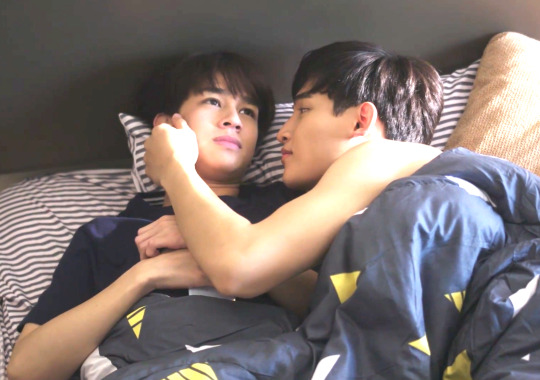
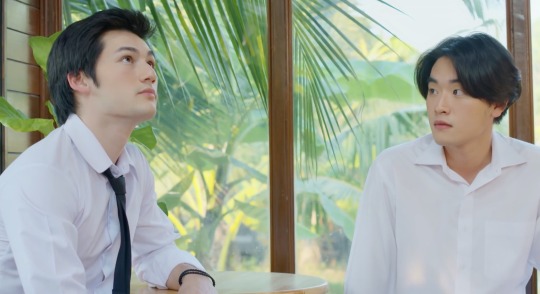
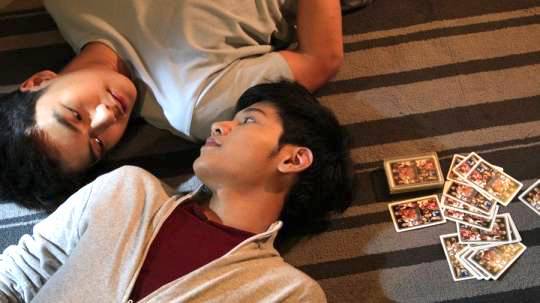
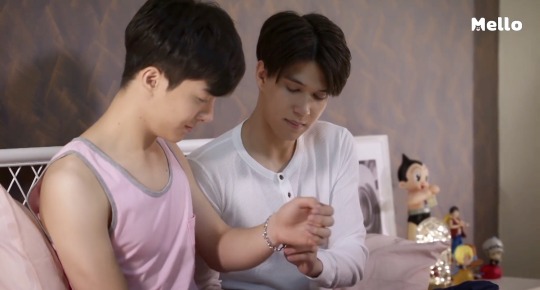
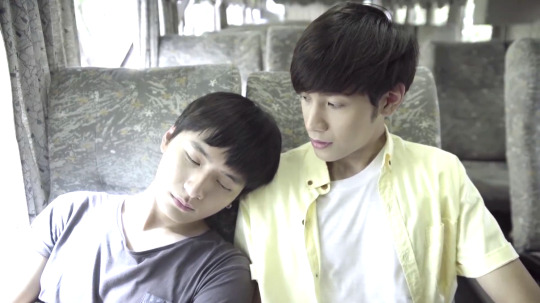
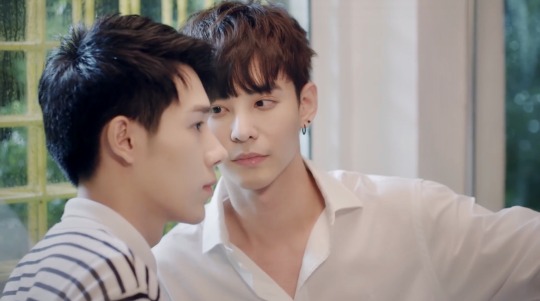
For example:
I = Pom (the younger male) or own name, Phi or P (the older person)
You = name (older to younger), P+name (younger to older) or just P (younger to older less formal)
P’ is technically an honorific but it can also function as a pronoun.
Note that all the above pictured couples have an age difference? That encourages a certain amount of politeness. You can see our two baby brats (Team & Duen) for exceptions to this. I’ll talk about them at the end.
Dean drops his honorifics a lot, but with everyone not just Pharm. His character is linguistically quite curt.
Also there is a slight variant in Solo & Gui. Solo adopts the pet name “Guitar” instead of using P’Gui or just P (for you). But he does this only after obtaining permission. So I’m still listing them under the polite-couple heading.
(Incidentally, Tan & Bunn in Manner of Death use the grown-up polite pronoun khun - you - with each other. Yet another way MoD is not BL.)
Couples that use rude informal pronouns with each other...
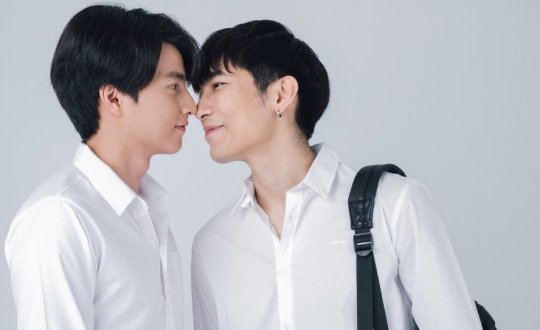
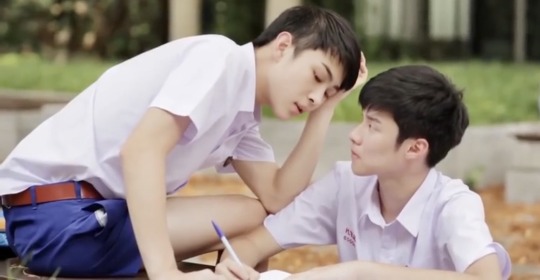
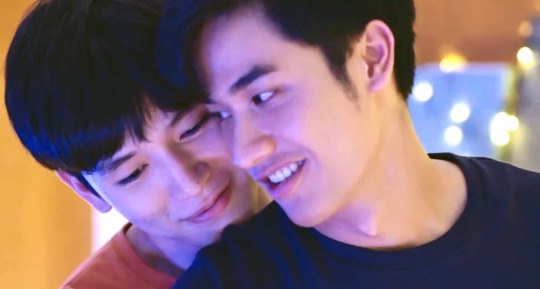
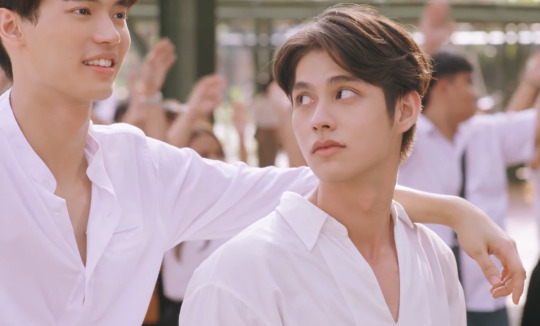
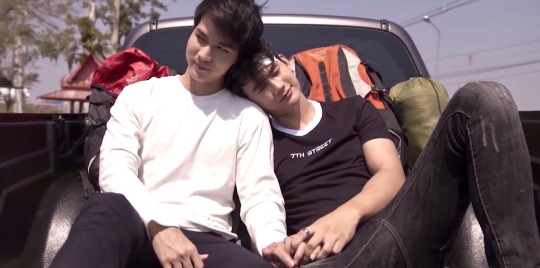
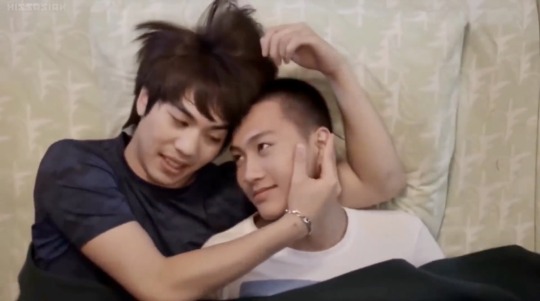
I = guu
You = mueng
Note that these couples are all the same age as each other? (Just FYI if you travel to Thailand as a tourist, please don’t use these pronouns.)
Couples that use mixed pronouns with each other...
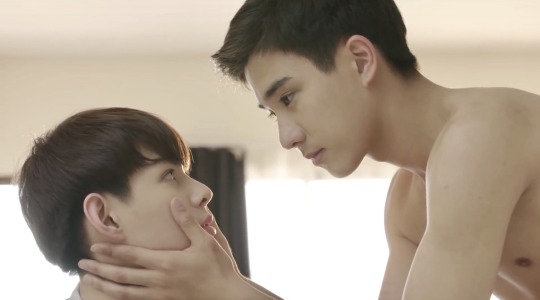
Ae uses rude pronouns (guu/mueng), Pete uses VERY polite pronouns (he’s the only character I know who uses rao - old fashioned, cute, formal - for I/me as well as pom). They are the same age so honorifics don’t really come into play. Pete never defaults to rude pronouns even as a form of affection.
This linguistic difference is used by the narrative to stress the class and income gap between Pete and Ae. Also, Pete’s way of speaking showcases his shyness, stiffness, childishness, and loneliness. Finally, you can also see Pete use formality of address to extract himself from sticky social situations - he is very good with his wai.
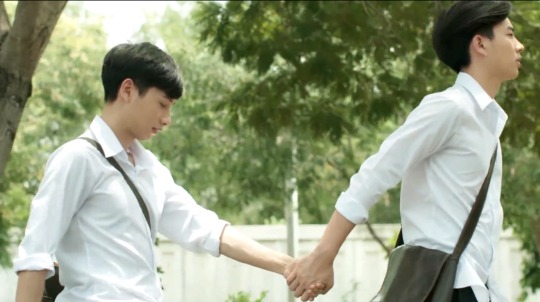
Rome uses polite pronouns and honorifics. Pick uses rude pronouns. Which is somewhat okay given Pick is older than Rome, but still amusing as it emphasizes their personality differences. Also it’s one way in which we can see Rome given confidence in Pick’s affection since Pick doesn’t bother to maintain formality but drops to guu relatively quickly.
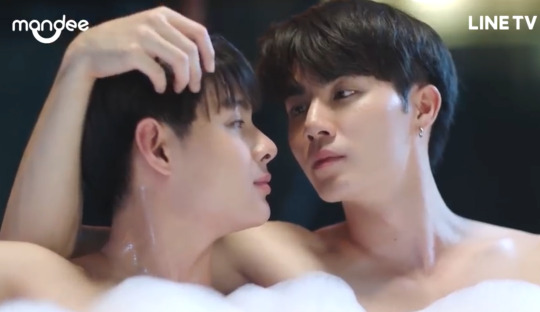
Tutor uses polite pronouns and honorifics with Fighter. Sometimes he uses them as if they were weapons to maintain distance. Fighter uses impolite pronouns with Tutor. Again this is a bit more okay because he is older, but also it shows a level of flirtatious interest and allowance.
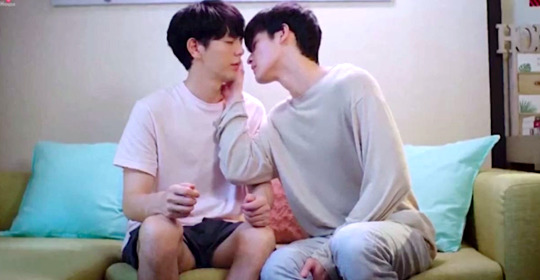
Sib uses polite formal adult pronouns with Gene in Lovely Writer (kind of like how you might talk to you parent’s friend, or in an office workplace). You can spot this specifically with his use of khun for you. Gene uses polite-pronouns at first, but they have discussions several times about what is going on, because Gene is confused as to why Sib doesn’t just use P’Gene with him. Gene eventually gets annoyed enough to drop to rude pronouns. Sib states that he intends to eventually call Gene something else and continues to use khun. The extreme variant in their resulting registers is kinda hilarious.
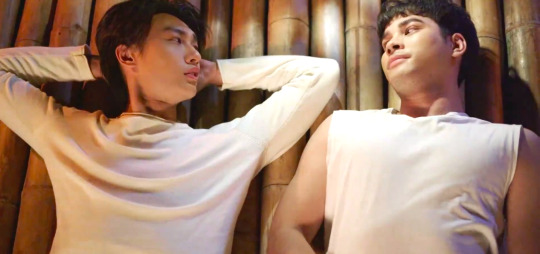
Sky & Sun in Golden Blood I think are meant to be the same age (or Sun maybe older?) but Sky uses informal pronouns (as if he were older) while Sun uses formal pom etc... This is because of the class difference and the fact that Sun is household employee. Interestingly, when Sky is imagining talking to Sun in a romantic way he uses P’Sun, but not in person.
The Linguistic Brats of Thai BL...
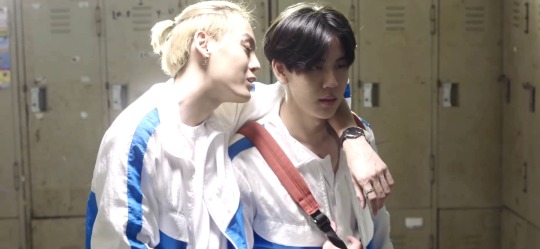
Linguistically Team and Win are adorably aberrant.
Team drops the honorific P’ with Win almost immediately. While he maintains the use of polite pronouns, he usually calls Win hia. That’s brother as used by some Thai speakers who have Chinese heritage and is less formal than P’Win. It carries with it a certain quality of household intimacy. It is... erm... somewhat cheeky.
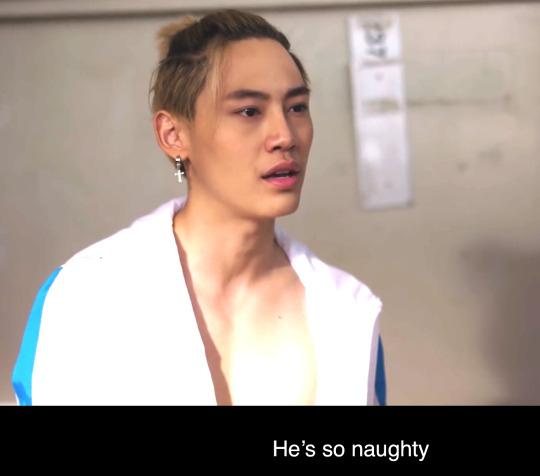
Win, on the other hand, uses rude pronouns, but then he does that with lots of people.
Win also applies emphasis to polite pronouns to make them seem sarcastic, e.g. nooong Pharm.
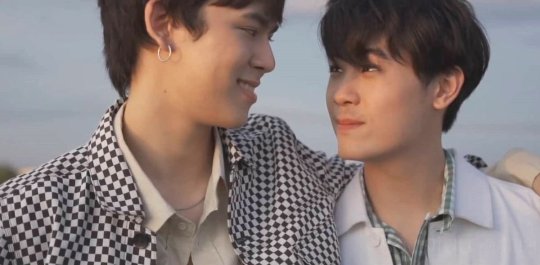
Bohn and Duen are a fascinating pair because they actually discuss honorifics and pronouns as a plot device in their story arc.
Duen drops the honorific and uses rude pronouns instantly with Bohn, even after realizing Bohn is older than him. This is SO RUDE. It’s difficult to articulate how extremely impolite this is. I think it’s one of the reasons Bohn likes Duen (obviously boy is attracted to brats).
Duen is the only younger character I have ever seen do this in a Thai drama. (I gasped more at Duen’s pronoun use than the punch that preceded it.)
This is why Thara is so confused when he encounters them in the clinic. Duen is throwing mueng and guu at Bohn like there is no tomorrow, but Thara knows Bohn is older.
When Thara asks if they are friends he means intimate close friends of long acquaintance, since it is so unusual to use rude pronouns across an age gap.
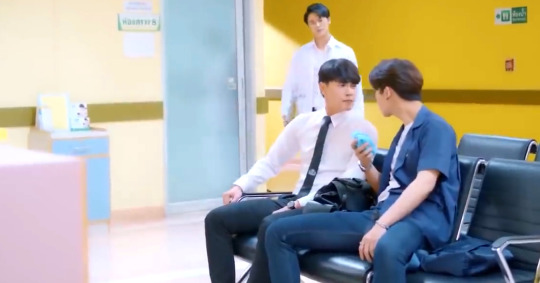
New Section MORE on...
Thai Pronouns & Honorifics when Seme/Uke is Age Flipped
So this concerns personal pronouns in Thai when the uke/seme dynamic is age flipped. So the older boy (who normally carries the linguistic power/dominance) is the uke (or romantic submissive character). In other words, we are talking about a conflict between linguistic D/s and relationship D/s.
KongpobArthit - SOTUS
MarkKit - Gen Y
MingKit - 2 Moons franchise
SoloGui - Oxygen
SibGene - Lovely Writer
This involves delving into the fact that when Kong and Arthit speak to each other, despite the fact that he is older, Arthit uses pom for I when we expect him to use phi.
On the other hand, Gui usually use phi with his seme under similar age dynamics and relationship circumstances. So Gui is linguistically acting like a polite seme (Dean in UWMA, for example). Kit uses rude pronouns, so he is linguistically acting like a rude seme (Pick in Puppy Honey, for example).
I could only check SOTUS S as SOTUS is off Netflix in my territory and hasn't been uploaded back to GMMTV's YouTube. So I'm not sure if this holds during KongArthit's initial meeting and warring romance.
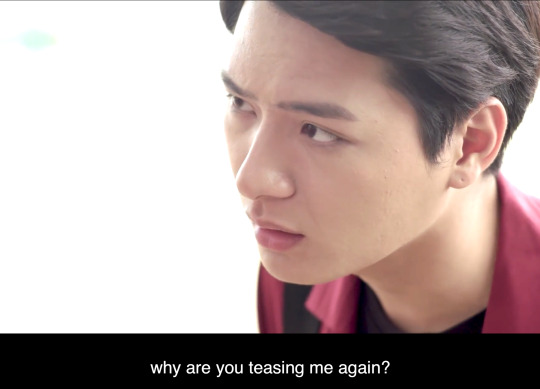
In the opening sequence of SOTUS S (them waking up together and getting ready for work) Arthit used:
pom and (of all things) káo.
I want to say I'm wrong on the káo because that is very odd for Arthit's character (lovey-dovey and mostly quite girly/cutsie). He also used khun for you at Kong which is super formal, although he mostly just calls Kong by name, and in an annoyed tone. So he's kinda all over the place.
Kong stuck with phi & P'Arthit for you, and pom for I. Which is normal for a younger polite uke character (like Pharm). So Kong is sticking to polite age language rules (and not letting seme influence him).
I think the fact that they both use pom is more an aspect that despite their flipped power dynamic across the age barrier, Arthit is way more agro and tsundere than Gui. (But why not just drop to rude pronouns then, like tsundere Kit?) One would be tempted to say Arthit should push the phi under those circumstances but I think Arthit's attitude is more: I don't even need the phi. It is odd though, you're right. Maybe there's a bit of Arthit still holding Kong at arms length by not using guu/mung with him (which he does use with his friends)? Guu/mung carries with it a certain amount of invited informality that might be seen as encouragement by a younger seme. It's interesting.
I've described Kong and Arthit as coming off as somewhat ace and I think maybe their linguistics are a bit that way too?
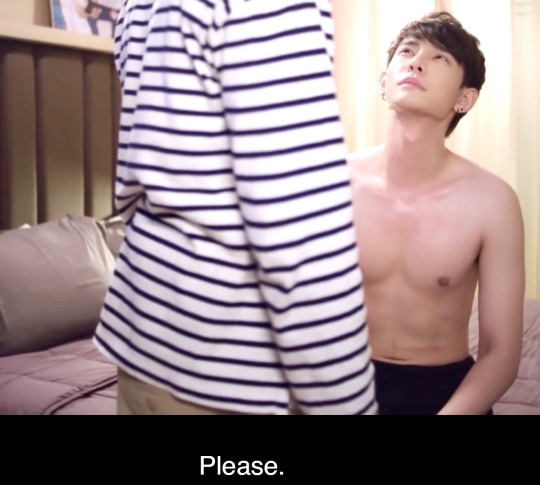
Solo/Gui are also skewed tho. Gui refers to himself as phi but pretty much everyone knows that the power dynamic is actually the opposite. Solo makes that clear regularly because he uses the pet name Guitar without honorifics (once he attains permission) constantly, which a younger boy would normally get swatted for as disrespectful. And the way Solo says that pet name is like it's this gift he's been given by Gui. It's clear Solo knows to value the fact that he has been handed the romantic power, and the ability to drop honorifics. But he sticks to pom for I and never crosses that line.
These two are just way more comfortable and settled into their roles and dynamics from the get go. Also Gui is a VERY caring and polite but also occasionally parental and strict for a uke, for all he's a total softie he does act older with Solo regularly. So for all that this is a pretty firm seme/uke dynamic there's flexibility to it around acts of service. Stil Gui’s use of phi for I with Solo probably ties to the fact that he may be uke but he still feels older and wiser than Solo.
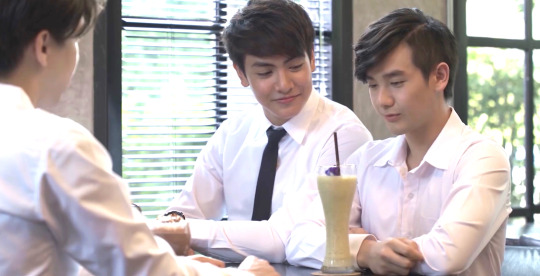
Kit uses rude informal with Ming in 2 Moons 2. Ming uses pom for I and phi for you, as if he were younger uke, during his attempts at courting. When they are cuddling or confessing later on in the series (Ep 9 for example), Ming drops the P' and just calls him Kit, no honorific, while still using pom for himself. So that's mixed informality and more what I would expect from a younger seme.
I guess there is at lot of linguistic meat to be had around younger seme's coupled to older ukes in Thai BL, because there is a clear honorific struggle resulting.
I mean Lovely Writer has a whole series of scripted chats about this. Since Sib is clearly an extremely dominant seme what he calls Gene is of deep concern to him. He refuses to use P'Gene (when they meet as adults) mostly because it's too submissive for what Sib wants from Gene. So he defaults to adult very formal Khun in order to cover his ultimate desire (and linguistic conundrum). This also makes Gene seem a whole generation older than Sib, though. And people around them find it weird, especially as Sib doesn’t do this with an other older boys - only gene.
They jump through a ton of pronoun hoops and honorifics during the course of their relationship as a result. They settle into the same pattern as MingKit in the end, with Gene using rude informal guu/mueng and Sib using Gene's name with no honorific and pom for I.
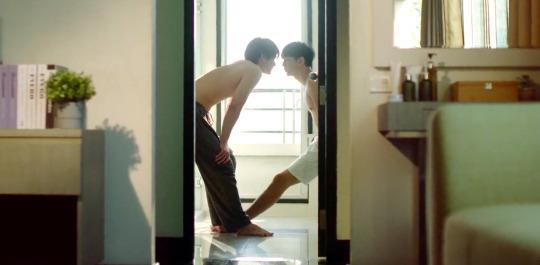
Real world note
Fluke (Pharm) calls Ohm (Dean) P'Ohm even though Fluke is a year older. The actors decided to do this between themselves, presumably partly based on personality and partly placed on the roles they played in Until We Meet Again. They found it easier to keep that dynamic on the promo circuit and have continued since.
Thus strict adherence to phi/nong based exclusively on age is not mandated IRL. Friends/lovers/coworkers/etc.. can alter language for social/cultural or interpersonal reasons. You can hear Santa & Earth on the Studio Wabi Sabi YouTube channel monkey around with this a lot. Earth is much older than Santa, but they very rarely use phi/nong.
That said, both Earth (LBC) and Fluke (UWMA) are out, so that could also come into play linguistically. Argh, so complicated.
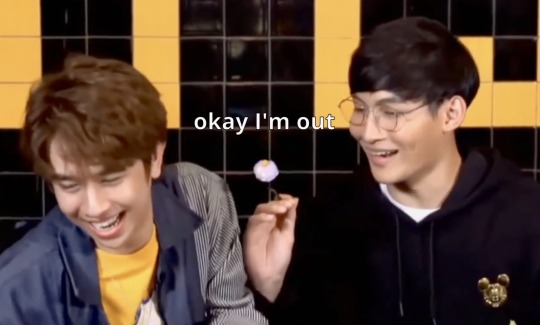
Further Reading
More about the “I” first person pronoun in Thai.
More about the “you” second person pronoun in Thai.
More about the 3rd person in Thai, and the propensity to omit pronouns altogether.
More about honorifics.
One last note:
Third Person Singular = Gender Neutral
Something Thai BL fans don’t often understand early on is that third person singular pronouns are often genderless (it’s rarely she/he her/him, it’s more like singular they/them).
In other words, Thai speakers self gender and direct gender others in conversation. (”I” and “you” carry gender, politeness, and other cultural connotations.) But Thai speakers do not usually gender others when talking about them in third person (see káo). Despite what you’re taught in remedial Thai.
Also, many nouns that would carry gender in English don’t in Thai. For example, the word faen is usually translated as boyfriend/girlfriend, but it’s actually genderless and more weighted, like lover+special someone.
This is why, for example, Dean has to explain to his grandmother that he is dating a man in Until We Meet Again. This is also why translators find it difficult to do justice to the scene at the end of Love Sick 2 when Phun comes out to his dad (or does he?).
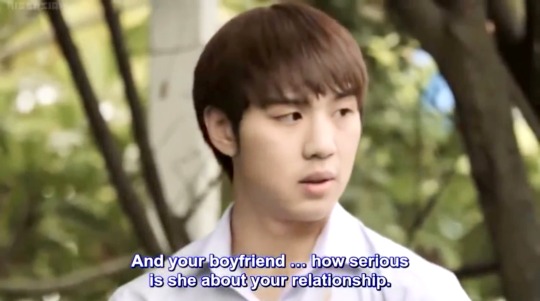
Maybe: “And your lover is serious about this relationship?”
Final note, I have made an extremely complicated subject as simple as I can for the purposes of greater BL understanding. And my own amusement. Read the articles linked above if you want something more nuanced and professional.
~ Armchair amateur dilettante signing off.
Updated to say the the TharnType Wedding Special finally hired a subber who used the Singular They!
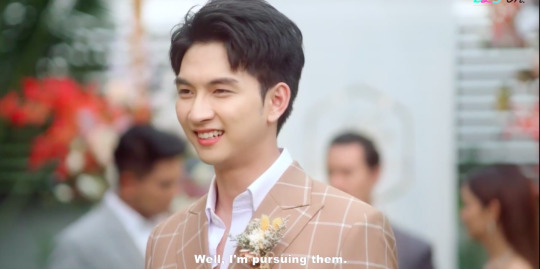
(Incidentally all of this relates to the fact that Thai has registers which are based on many social factors, it’s really fun stuff. BL plays around with them too.)
Others in this series: Explaining Thai to the Bl Watcher, what you might want to know to understand the story and culture.
Also because the flipped power dynamic of a younger seme with an older uke complicates Thai pronouns and honorifics, I go deep into that because of a question about Kong & Arthit. Also talks about MingKit, MarkKit, SoloGui, and SibGene.
Explaining Thai to the Casual BL Watcher - It Has Registers
Linguistic Fun In Thai BL - Pronouns & Honorifics
BL Actors & Age Dynamics
Thai Pronouns & Honorifics when Seme/Uke is Age Flipped
Thai Honorifics Between Ages in BL and real life
(Original post is kept updated here.)
#thai bl#asian bl#thai language#thai pronouns#asian bl drama#language and plot#deanpharm#until we meet again#fighter tutor#fightertutor#why r u#winteam#my eningeer#bohnduen#ramking#mesthun#hes coming to me#thunmes#2 moons 2#phayo#forthbeam#SOTUS#SOTUS S#kongpobarthit#oxygen the series#sologui#polite pronouns#honorifics#love sick#golden blood
568 notes
·
View notes
Text
That’s right! It’s been far too long, and I need to do another discussion of, what remains to this day, my #1 anime: Fate/Zero. Oh darling, how I’ve missed talking about you.

First off, I’m probably one of the few people on the planet who, for the most part, doesn’t take too much issue with the concept of prequels. I get why such stories are flawed and inherently so. Going into that kind of detail on something that was only mentioned in passing as a previous event in an original work can be detrimental to that work, punching in plot holes and whatnot. Plus, it takes away the mystery that some find more appealing about the “story before”: giving a detailed account of that takes away that mystery.
Speaking for me personally though, I kinda like it. I mean, I’m the kind of person who squees on the inside at stuff like Thranduil at the end of the third Hobbit film telling his son Legolas that he might want to look into finding a Dunedain ranger named “Strider”, a.k.a. Aragorn, son of Arathorn, a.k.a. the once and future king of Lord of the Rings, timeline consistency be damned! I love Easter Eggs in all their forms.
Which means perhaps I’m biased on this opinion, and to a degree, I am. But, I still think objectively as well as subjectively that Fate/Zero really does work well as a prequel.
Why?
A few reasons, but:
The short answer? It’s a tragedy.
In both the classical and the emotional gut-punching sense.
In the classical sense, we’re talking about actions that have consequences that are inevitable. In the emotional gut-punching sense, it’s that those consequences utterly destroy our heroes and heroines in their feels.
Anyone who’s experienced the original Fate/Stay Night, either in anime or visual novel form, or both, already knows that the consequences to many of the actions taken by the characters in Zero are inevitable. At the same time, for anyone who’s watching it before watching any of the other Fate material as a stepping off point for the franchise, it still works as a strong story of characters who sabotage their own goals through their own flaws, made tragic by how earnest they are in endeavoring to overcome them. Not to mention the sheer number of feels and brutal deaths and OMG this anime. (They didn’t give its original light novel writer, Gen Urobuchi, the sobriquet of “Urobutcher” for nothing.)
Sure, in the end, some plot threads are left frayed and fluttering in the breeze because the main Stay Night plot points are all set up here at Zero‘s conclusion (though that does produce the disadvantage of no longer making the story twists in Stay Night…well…twists). Despite that though, there is still a completeness to the ending.
Somehow the loose ends are written so they don’t feel loose. Sure we find out in the Heaven’s Feel route of Stay Night that Illya is Kiritsugu’s precious daughter that he was unable to save. Sure, in the Unlimited Blade Works route, Kirei gets his just-desserts for that little infraction of killing Rin’s father, Tokiomi Tohsaka. Sure, in the Fate route, the revelations that Saber was a gender-bent King Arthur and was Kiritsugu’s servant in the previous Grail War come to light.
And knowing those things, or lack thereof, can affect how you watch Zero. Knowing them can fill you with excitement when you see these addressed in the prequel (at least for me, since again, this is something I actually like about prequels). Not knowing them gives them their own fresh and engaging life in the flow of the narrative.
When watching Zero, we last see Illya waiting hopefully in the snowy Einzberns’ castle for her beloved father Kiritsugu to come back to her, only to learn that because he’d tried to destroy the Grail (because it’s corrupted), the Einzberns considered him a traitor and shut him out, preventing him from seeing her ever again.
We last see Rin at her father’s funeral. Kirei (who presided over that funeral no less) gives her the ceremonial dagger that her father himself had gifted to him for being his pupil in magic, only to immediately use it to literally stab him in the back. It’s only upon receiving the knife and learning that it was her father’s, that Rin finally allows herself to cry, Kirei secretly relishing her tears and the knowledge that he just gave her the weapon he’d used to murder her father as a present, and she’s none the wiser.
We see Sakura resigned to her fate as a future vessel for the Grail while carrying the weight of the Matou Family crestworms inside slowly killing her, despite her “uncle” Kariya Matou’s efforts to save her by winning the Grail for his wicked father. Efforts that were, for lack of better term, “ill-fated“.
We see Saber summoned at the conclusion of the first episode, with Kiritsugu believing that King Arthur was well a King, only to learn right off the bat that she was a woman in disguise the whole time (and that becomes a thing).
Regardless of knowing these things prior, the writing itself gives the scenes that are meant to allude to these later plot points a gravitas of their own worthy of praise. I am in a bit of a weird position where I started watching Fate/Stay Night (2006), which followed the first story route, the Fate route, with Saber (Arturia) as the heroine. Then I dropped it about a quarter of the way and bypassed straight to Zero. I was just too excited to wade through the lackluster production values of F/SN ’06. So I both knew and did not know things going into Zero. I had the opportunity to see certain things with a well-crafted setup in Zero, and still be engaged by both them and by things that were new to me in the sense that I wasn’t aware of their relevance not only to the Fate route, but to Unlimited Bladeworks, and Heaven’s Feel routes respectively.
Though I knew that it was going to come up that Kiritsugu was Saber Arturia’s Master in the Fourth War, I was still jarred by how frigid their relationship was pretty much from the word go. And it was interesting seeing someone as openly passionate about justice as Saber was getting stonewalled by someone like Kiritsugu, seeing as how his own passion for justice turned out to have been just as great. It’s just that he’s already let “reality” turn all that into a cold, calculating fire that’s compelling to watch burn so slowly, that struggle between that BBC Sherlockian sense of “Will caring about them [people] help save them?” and caring too much being the whole reason for what he does. That idea of wanting to bring the world salvation through an end to conflict, weighed movingly against how much he cares for his own family. It’s something that craftedly underpins his whole character. And anything like that will never be boring for me.
Rin meanwhile, even at a tender age, shows great potential as a mage, having started her education in magecraft in Zero. There’s an entire episode in there dedicated to how far she’s come and how far she still has to go. And it’s still exciting for those who already know that she’s going to be the capable Master of Archer in the Fifth Holy Grail War of Stay Night because of how well those parts showing such are executed in Zero, as equally exciting as it is to see it as someone going in blind.
Kariya Matou is motivated by the purest of things, love, to save Sakura Matou (formerly Tohsaka as Rin’s little sister) after she’s adopted into the Matou family simply to be used and abused in the worst ways. But for all that, it isn’t enough for him to succeed and failure is one of the most brutal things to watch.
Just about one of the most precious things I’ve seen in anything, never mind anime, is the scene of the walnut-finding game Kiritsugu and his daughter Illya would often play, because we see them play it one last time before Kiritsugu leaves for the Grail War at the beginning of the show. Even without being aware that this is the last time that they will ever see each other again, the hug goodbye that Kiritsugu gives Illya is still bittersweet because of how Kiritsugu’s character has been set up as this sober and reserved man carrying the heavy burden of his wife’s inevitable death, the cost for his wish to save the world, beautifully and poignantly juxtaposed against him acting playful, happy even, with their only child. (That, and well, there’s me who’s outed herself as a sucker for daddy-daughter relationships in fiction.)
Being a tragedy then, not only are all of the characters’ fates inevitable, and consequences of their own flaws, but they all end up spiraling apart into ultimate despair, with just the tiniest ray of hope at the end (which is the tease for Stay Night‘s continuation of the story, all three story routes accounted for). So what we’re left with is characters who either died broken, or survived broken, and for those who survived broken, we see that despite that, they find some reason to go on living (even if not for very much longer, and or even if not for the best of reasons). Just the same, it’s inspiring. Very Bluthian, actually. Despite all the trauma, it’s given worth of its own in that very last scene with Kiritsugu and his adopted son, Shirou, the protagonist of Stay Night, promising that things can be turned around for the better. That always gets me. From the very first time I watched it, I knew I had watched something incredible. An unduplicatable experience in the vein of finishing Harry Potter or Avatar: the Last Airbender.
It’s also something of a reset button where the anime adaptations of the Fate franchise are concerned. Somewhat ironically, the anime was produced so that the later adaptation of the Unlimited Blade Works and Heaven’s Feel story routes from the visual novel would work as sequels. Sequels to the prequel, as it were.
Then there’s the bottom line. It’s just a damn good show. Beautiful animation, beautiful music, beautiful character writing. Of all of the adaptations, it’s the one that works best as a standalone as probably Fate fans are ever going to get, given the nature of the source material. And with it being so good, it also has considerable rewatch value, which means that those “twists” that get “spoiled” are worth watching in the same regard that anything that has a known twist going in it is still worth watching.
And that…is why Fate/Zero actually works as a prequel.
Keeping this link up!
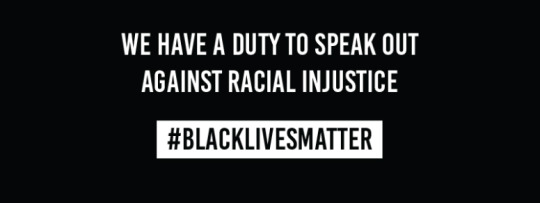
Why Fate/Zero Works As A Prequel That's right! It's been far too long, and I need to do another discussion of, what remains to this day, my #1…
#anime#avatar#bbc sherlock#don bluth#easter eggs#fate series#fate stay night#fate zero#gen urobuchi#harry potter#harry potter films#heaven&039;s feel#light novel#lord of the rings#prequels#sherlockian#sobriquet#the hobbit#the last airbender#tragedy#type-moon#unlimited bladeworks#urobutcher
3 notes
·
View notes
Text
AVENGERS: ENDGAME REVIEW
“Whatever it takes to keep spoilers from spreading.”
BY COLLIN DELADE

Everything comes to an end with AVENGERS: ENDGAME. Eleven years and twenty-two movies have led to this moment. The trailers have shown very little of the actual plot to create an extraordinary, energetic cinematic experience. As the filmmakers want minimum information to release, this review will be completely spoiler-free.
AVENGERS: ENDGAME is the twenty-second film in the Marvel Cinematic Universe. After the devastating aftermath of AVENGERS: INFINITY WAR, our heroes struggle to move on from the high number of lives lost. While everyone else tries to move on from Thanos’ snap, the remaining Avengers just can’t live with their mistakes. After some familiar faces show back up with a plan, the Avengers have one shot at making things right again.

Let’s give a little context on the impact of the MCU to the cinema. Just like how STAR WARS shaped a generation decades prior, the MCU has been a revolutionary movie series. This expanding universe and extended Infinity Gauntlet storyline have taken over pop culture along with critical and financial praise. The entire reputation of the series comes down to the quality of this movie. An absolute slam dunk will bookend one of the greatest cinematic stories ever told. A disappointing dud will make everything before it feels completely meaningless. The MCU has been the prime series of how to balancing being a smart, sincere, and entertaining blockbuster. Thankfully, AVENGERS: ENDGAME is no exception.

In a high budget comic book movie, the most active scenes are merely when the characters are talking with each other. So many praises deservedly go to the writing and creative teams for taking the time to flesh out these characters throughout the years. A five-minute dialog between two characters is genuinely entertaining without any action or comedy thrown in. The first half of the film prioritizes on the dialog over the action to effectively build on the already high stakes.
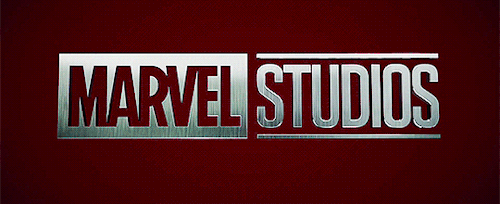
This movie goes very far at establishing the universe after Thanos’ snap in the last film. The loss of so many people sets a very frightening and helpless tone for all the remaining survivors. INFINITY WAR’S ending was mind-blowing; END GAME perfectly continues its narrative while addressing nearly every question, and concern fans have discussed. The amount of dedication to showing the aftermath of the snap really drives home how massive the ending of the last film was to our heroes.
As the culmination of twenty-one previous movies, directors Anthony and Joe Russo have a tough balancing act to pull off. Even more crucial than INFINITY WAR, this movie desperately needs to succeed at nearly every level for both casual viewers and die-hard fans. ENDGAME is definitely not intended as the first movie to see out of the franchise, as tons of references and callbacks would go completely over a first-time viewers head. Watching ENDGAME first before any of the other entries is like only wanting the last HARRY POTTER movie and none of the previous seven films. ENDGAME unapologetically doesn’t stand on its own; it’s such a satisfying conclusion for hardcore fans like myself.

There has been so much speculation as to what will happen throughout the movie. Any theory remotely credible and appropriate is a possibility to be included in the final film. ENDGAME appropriately plays with audience’s expectations; fans can expect to see some of their predictions come true while also seeing their most dream of moments coming to life on the big screen. My expectations were through the roof as to what could happen by the end of the film. Somehow, the Russo brothers manage to wrap up nothing only the storyline from INFINITY WAR, but also everything built up in the entire franchise.
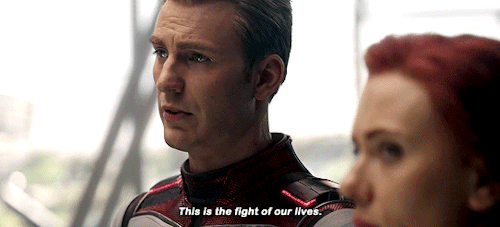
With all my praises for this movie, I would still put INFINITY WAR over it as my favorite MCU movie. While I had very minor problems with INFINITY WAR, I found a couple of cringe-worthy elements that slightly bring it down. Mainly, the direction taken with one of the essential characters feels very out of place compared to the rest of the cast. Purposely, audiences are meant to feel embarrassed with how this character turned out. However, it goes way too over-the-top and comedic for the severe personal drama going on. Also, a significant subplot that’s entirely crucial for the entire storyline to work is brushed off and fixed at the very last second.
Considered both as a strength and weakness, the film’s three-hour runtime completely flew by. There was never a moment where the movie dragged or felt too long; which leads to the downside of the completed story. This important plot detail needed at least an extra half hour to fully play out with the rest of the story. One piece of dialog meaning to set up a moment at the end of the film is played up as too high stakes for its minor role.

AVENGERS: ENDGAME is everything I wanted as a Marvel fan. There is so much to love about this movie, especially with its great marketing campaign. This is a movie that absolutely demands to be seen on the biggest screen possible with a sold-out crowd. As one book closes with the MCU, another one is open, as I can’t wait to see what Marvel has in store for us next. five-minute
9.5/10
youtube
#Avengers#Avengers infinity war#avengers endgame#end game#robert downey jr#Chris Evans#chris hemsworth#superheroes#marvel#marvel cinematic universe#movie#review
4 notes
·
View notes
Text
Dragon Quest-ions Answered: Fujimoto-san Talks Dragon Quest Builders
Hi hi, everyone! Theresa from Treehouse here. Hope you’re still having fun saving the world of Alefgard, and keeping it out of the Dragonlord’s clutches.
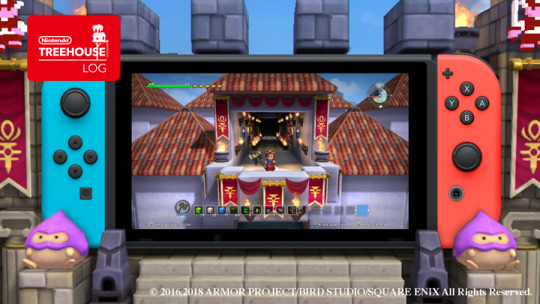
With all of these sconces and braziers, you could say I have a thing for fire…
The Dragon Quest series is a powerful force in the world of Japanese RPGs, and Square Enix has quite literally rebuilt the experience from the ground up, creating something exciting for fans and newcomers alike. As for me, I’ve had the wonderful opportunity of working with them leading into the launch of Dragon Quest Builders on Nintendo Switch, and as a fan of the game myself, I took a moment to ask the game’s producer some burning questions…
Theresa:
This game takes place in the world of Alefgard—the setting of the very first game in the Dragon Quest series. Why did your team decide to return to this important location in the Dragon Quest franchise?
Fujimoto-san:
We felt the objectives and setting of the game would be intuitive if the world from the first Dragon Quest had fallen into ruin, and you were tasked with recreating it as you saw fit.
The final boss of the first Dragon Quest, Dragonlord, has a famous line, “I give thee now a chance to share this world and to rule half of it if thou will now stand beside me.”
If you answered “Yes,” the world would fall into darkness. Game over. But Dragon Quest Builders takes that world clad in darkness and allows you to rebuild it as you see fit. This game challenged us to create an alternative, hypothetical world, one that progressed differently in important ways.
Also, we used graph paper when we were creating the 2D pixel tiles of Alefgard’s geography in the original Dragon Quest game. So, in a way, Dragon Quest Builders revives the original game world with both 2D and 3D blocks, and we hope everyone will play this reborn vision of Dragon Quest.
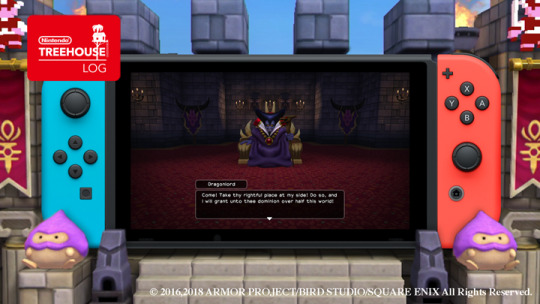
It’s difficult to pull off that look and look regal in an evil throne room.
Theresa:
The cities you rebuild, like Cantlin, are from the first Dragon Quest game as well. How did the development team go about choosing which specific cities players would get to rebuild?
Fujimoto-san:
We had an idea to reverse the order in which players visited cities throughout the original Dragon Quest story. The flow we ultimately chose starts the player out near the Dragonlord’s castle, sending them off to rebuild surrounding cities and finally revive Tantegel Castle, the starting area of Dragon Quest, only to return to the Dragonlord’s castle across the sea.
Theresa:
On the subject of building, this is a pretty significant step away from Dragon Quest’s traditional gameplay style. Why did you decide to reimagine an established RPG franchise as a building game?
Fujimoto-san:
The Dragon Quest numbered series continues to be created in the tradition of classic RPGs in which the hero saves the kingdom. While we use those traditional RPG elements as the focal point for non-numbered Dragon Quest games as well, we also use those titles to experiment with other ways to play in the Dragon Quest world.
With Dragon Quest Builders, we sought to create a play experience that had never been accomplished before—a marriage of Dragon Quest RPG elements and sandbox elements that lets you freely create things.
Sandbox-style games are not something that most Japanese players are deeply familiar with, and we developed Dragon Quest Builders with this in mind.
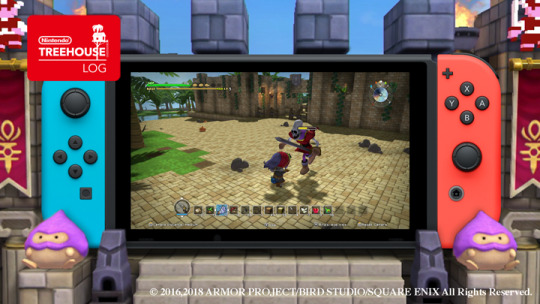
My immediate reaction to anything that was once dead and comes back to life. *insert repeated attack button presses*
Theresa:
Looking at this game, some people might think that it’s simply a building experience, but there’s actually a really engaging story here too. Can you please tell us more about how this story was developed, and how the building elements were integrated into it?
Fujimoto-san:
From the very beginning, we decided that the overall story would be about getting caught up in the Dragonlord’s trap at the end of the first Dragon Quest game, having the world fall to ruin, and then reconstructing the world. But we knew that charting out the plot and the building gameplay elements simultaneously would result in a half-baked, non-cohesive game. So, instead, we focused on designing the gameplay first, basing the mechanics on what we wanted the user to create at various points and what tools they would use to accomplish these builds. That way, even just the simple act of playing is fun and highly motivating. Finally, we then thought up details of the plot that would work well with these mechanics as we fine-tuned the gameplay.
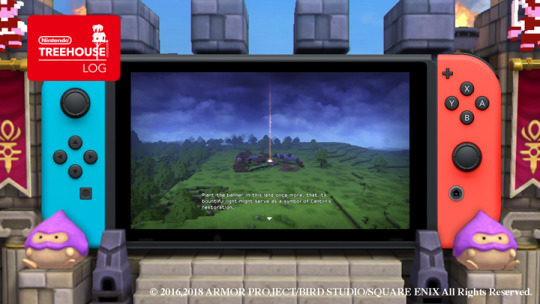
The goddess has spoke-eth—I shall rebuild this land and claim it my own! …Err, fine, I’ll claim it for the people, I guess.
Theresa:
Since the game’s original release, how have you seen new players, as well as Dragon Quest fans, react to this “classic RPG-meets-builder" style of gameplay?
Fujimoto-san:
It feels like we’ve allowed Dragon Quest fans who haven’t played a sandbox style of game to easily discover the fun of this play style through this carefully crafted mix of RPG and sandbox elements.
This is the same type of reaction we received when the first Dragon Quest game expanded the appeal of the RPG genre in Japan 30 years ago.
Theresa:
Since Dragon Quest is such a long-running series, there was a lot of deep lore for the development team to draw upon while working on this game. What is your favorite surprise or Easter egg hidden away for fans to find?
Fujimoto-san:
There’s a lamp that you’ll need certain building material to craft. If you make this lamp and place it in a room, some sort of change will happen to the villagers. In Dragon Quest, this is a household element and one minor, fun item.

The Slime with the little beanie hat is my personal favorite throwback in this room. Super cute!
Theresa:
While knowing Dragon Quest lore certainly adds to the experience, players don’t need to have played previous Dragon Quest games in order to follow what’s going on and enjoy it. How did the development team ensure that this game would be so accessible for new players?
Fujimoto-san:
For Dragon Quest itself, the game designer, Mr. Horii, always chooses mechanics that the player can instinctively understand, and puts his heart into creating something that anyone can relax and play without having to look at the manual. When Mr. Horii playtests a game still under development, he always plays it as if he was a brand-new player. Then we revise all the stumbling points.
Dragon Quest Builders was developed with similar tests in mind, ensuring that even those with no knowledge of the Dragon Quest series can freely enjoy the game.
Theresa:
It’s an interesting design choice to have the player start each chapter from what is essentially square one, as they teleport to the next town with the most basic equipment and no access to their previous materials and constructions. What made the development team decide to structure the game in this way?
Fujimoto-san:
Actually, the initial plan was not to split the game into standalone chapters, but rather to have everything connect in one overarching flow. But during the development process, the director, Mr. Niinou, suggested that we make a big shift in this plan. He proposed that we split the story into more distinct chapters to address a problem that occurred when all of the pieces of the narrative were more interconnected.
To illustrate this problem, imagine that you’ve just rebuilt the town of Cantlin and moved on to the next area. If you’re still able to access the location you’ve completed, then collecting the resources you need for the work ahead will be a very simple task. And there goes the challenge of the game! We realized that it would be too easy of an exploit to harvest new materials by continuing to build up Cantlin throughout the game. For this reason, we changed direction and split the story experience into chapters, so that the player would be able to create each area with a refreshed outlook.
In making this change, there was a concern that you wouldn’t be able to revisit your experiences from chapters you already played*. So, we designed it so that, as the chapters unfold, some sort of progression occurs. It’s a spoiler, so I won’t say any more than that… (laughs).
*Spoiler-Free Note from Theresa: Discovering fun details in Story Mode is really fulfilling! Normally, sleeping in a game is a simple act to restore health, but in this game, there’s something more to uncover. Also, after completing a chapter in Story Mode, you’re able to unlock similar areas within Terra Incognita, so you can gather and build things that you’ve encountered previously.
There’s a satisfying feeling in creating so many things, and that over time, you’re able to build better and more complex creations. And in doing so, you feel this nice progression for your skills in the game, which sets you up for the ultimate challenge near the end.

I hear the next town’s gonna be a real fixer upper…
Theresa:
Fair enough! (laughs) Let’s change topics, then… This game features music from a wide selection of Dragon Quest games. How did the team decide which tracks to include?
Fujimoto-san:
Well, to start, since the game is set in the world of Alefgard from the original Dragon Quest, we created arrangements of all of that title’s music. From there, since the game was developed with creation at its core, we pulled in songs from the numbered series that are relaxing. And for the emotional story scenes, we used stirring music from across the series.
Theresa:
What was the thought process behind adding the Great Sabrecub and Dragon Quest Game Pak as exclusives for the Nintendo Switch version?
Fujimoto-san:
Terra Incognita (free-build mode) is a vast land, so we thought it would be fun to enhance the player’s ability to move about quickly, take down monsters, and gather materials. That’s where the Great Sabrecub mount came in.
In Dragon Quest, the Great Sabrecat often appears as a mount, but in Dragon Quest Builders, its head didn’t look quite right, so we decided to use the cute Great Sabrecub for the first time.
We also have completely recreated the look of the original Dragon Quest game’s cartridge on the Famicom. We had an idea of placing it in the land of Dragon Quest Builders, and from there, thought about the possibility of creating retro Dragon Quest themed blocks and objects.

Pouncy! Pouncy! Pouncy!
Theresa:
As a follow-up question, can you tell us more about why the development team decided to make this exclusive content only accessible in Terra Incognita?
Fujimoto-san:
If you use them in the story mode, it breaks the balance of the game. Since strange blocks and objects exist in the landscape of Terra Incognita, we made sure the exclusive content was only usable there.
Theresa:
Thank you so much for your time today! As we wrap up here, do you have anything else you’d like to say to the fans?
Fujimoto-san:
We’d love it if you used the in-game feature to upload the cities and landscapes you’ve created in Terra Incognita. We are very interested in seeing what sort of world you have created in Dragon Quest Builders. I’m sure there are those who have beautifully revived the cities, or others who’ve completely destroyed their world’s mountains and cities and everything... (laughs)
We are working hard to develop Dragon Quest Builders 2, so we hope you are looking forward to it.
Also, for those of you who haven’t played Dragon Quest Builders yet, please go try the demo.

Ever feel like your day is just taking you around in circles?
Theresa:
Thank you so much to Fujimoto-san and the rest of the team at Square Enix for providing us some of the gritty details behind the development of Dragon Quest Builders. For me, this game has been a great intro piece to the Dragon Quest franchise and a comfortable gateway into building-style games. I hope you all get to experience it and share your stories—as well as your building masterpieces!
That’s it from me for now. Tune in next time, fellow gamers! ^^
—Theresa A.
52 notes
·
View notes
Text
Kingsman: The Golden Circle - Quill’s Quickies (No Spoilers)

Reviews for this have been all over the shop. Some love it, others hate it. Some found it to be as sharp and as witty as the first instalment, whereas others felt that the joke has gotten old by this point.
What did I think of Kingsman: The Golden Circle? Well I won’t deny I had a good time watching it. Is it as good as the first Kingsman? Certainly not. There are loads of problems with this, but compared to some of the other shit I’ve had to put up with this year, at least Kingsman 2 managed to hold my attention.
By far this film’s biggest strength lies with its main characters Eggsy, Harry and Merlin (yeah I don’t think I’m giving anything away when I say Harry survived his gunshot to the head in the first movie. He’s on the bloody poster and everything). Taron Egerton, Colin Firth and Mark Strong give incredible performances and I love the journeys their characters go on. We see how Eggsy tries to balance home and work life, as well as reflect on his growth over the course of these two movies. We learn a great deal more about Harry this time around and explore some of the tragic underpinnings to his character. The explanation for how he survived is utterly convoluted and stupid, but enjoyably so, perfectly in keeping with the franchise’s tongue in cheek humour, and the relationship between him and Eggsy leads to some of the film’s most emotional moments. Merlin too is given more development as we learn just how much Kingsman means to him and the lengths he’ll go to to help his comrades. I’m really annoyed however that Roxy isn’t in this movie much and isn’t given the same development.
The action is as fast, stylised and hyper-violent as ever, although the threat and tension is undermined sadly by the fact that we now know death is just a minor inconvenience in this world. Also the over-reliance on CGI makes the whole thing look like a video game at times, but despite all of that it’s still fun to watch. That’s the thing about Kingsman. The whole thing is so incredibly bonkers and over the top that it’s hard not to derive some enjoyment from it.
The humour and writing is still pretty sharp overall, although lacking the same polish and attention to detail the first movie had. There are some scenes that don’t really go anywhere and there are certain aspects that could have used more development. The film continues to explore the series’ themes of privilege and elitism as well as continuing to take the piss out of the spy genre, but at times the movie feels more like a jumble of ideas rather than a coherent story.
One thing I feel I should warn everyone about is that there is another controversial sex scene in the same vein as the anal sex gag from the first movie, only this one is even more explicit. Now to the film’s credit, this sex scene is not quite as glib as the anal sex gag. There is proper narrative context for it plus it does explore certain moral issues that most spy movies tend not to delve into, as well as addressing a certain hypocrisy when it comes to the way people view spy films (basically what I’m saying is James Bond would have done something similar to this, but nobody would have complained because it wouldn’t have been so explicit, and that’s the hypocrisy). That being said, like with the anal sex gag from the first film, the sex scene does cross the line between making fun of sexist tropes and reinforcing sexist tropes, it’s incredibly uncomfortable to watch due to the explicit nature of it and I actually would have preferred it if Matthew Vaughn cut it from the film entirely. I can see what he’s trying to do, but I wish he would stop. He’s clearly not very good at it.
I should also mention that the Swedish princess actually comes back for the sequel and is actually given more development this time around, so she’s an actual character now as opposed to just a sexist punchline. Not a very interesting character, granted. She’s the same concerned love interest we’ve seen in hundreds of other movies, but at least she’s more than just a prize for Eggsy to win at the end.
Another problem is the villain. While her evil scheme is really clever and interesting, Poppy herself is a bit lacklustre. Julianne Moore gives a great performance and is captivating to watch, and we do get the gist of what drives and motivates her character, but she doesn’t get nearly the same amount of screen time Samuel L Jackson got. With Richmond Valentine, we really got to know the nitty gritty of his character and what makes him tick. Poppy, on the other hand, barely gets a look in. We get a few character quirks here and there, but that’s about it.
And then there’s the Statesmen. While a funny idea, you could easily cut them out of the movie and it wouldn’t have made the slightest bit of difference. Jeff Bridges and Channing Tatum are barely in this and we learn hardly anything about their characters. Pedro Pascal’s Whiskey gets the most screen time, but he desperately needs more development considering the role he plays in the film’s events. The only Statesman I gravitated toward in any way was Ginger, played by Halle Berry. While she doesn’t get much screen time neither, she’s the only one who seems to have a clear character and actually has an arc. If Matthew Vaughn is serious about this proposed Statesman spinoff film, I hope Ginger is the lead character.
So would I recommend paying money to watch this in a cinema? Well if you loved the first film, you’re probably going to like this. While Kingsman: The Golden Circle isn’t as good as its predecessor, it’s still a lot of fun despite its faults and there are quite a few moments of drama and real emotional pathos. Otherwise you’re better off waiting for this to come out on home media. Either way you won’t be completely disappointed, I assure you. This film may be a total shambles, but at least it’s an entertaining shambles.
6 notes
·
View notes
Note
What do you think of Viggo´s supposed death? The noise he made when falling and the complete lack of dramatic element regarding it make me think he is as dead ad Dagur. It would not surprise me to watch Hiccup attending that Maces and Talons match only to find Viggo has already won and greets him with open arms and something in the line of "My dear Hiccup, it is such a pity you couldn´t arrive earlier. I truly was hoping to compete against you"against you"
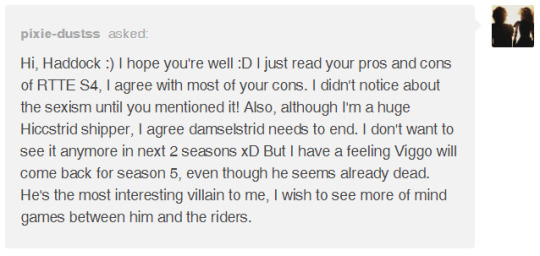
Hello, hello! Thank you so much - I’m doing well! I’m moving into a new apartment and it’s slowly coming together. :)
[Quick note on the damselstrid (continued from this post) before I chat about Viggo: The way I usually see Damselstrid dialogue occur within the Hiccstrid community is that either the individual doesn’t mind or they are very frustrated with the portrayal (I see much more of the latter on my dashboard). So I understand what you mean, yeah! It’s frustrating for all of us. As you saw in my previous post, I agree that it’s something that should be addressed and corrected in later seasons. I also guess I’m glad I helped illuminate the sexism within RTTE? The sad thing is I could continue elaborating with many more points… but I hope that, at least with pointing out some of the things, people can be aware it’s there. As much as I love the show, and as much as I will continue to love the show, it’s always good to be aware of the areas in which the show could use improvement, especially in areas of representation.]
As far as Viggo is concerned, I personally actually really hope he’s dead. As much as I love the mind games that Viggo has, and as much as I think he is a unique villain within the HTTYD realm, I don’t think that bringing him “back from the dead” would be the best choice of narrative. Even though there is a point to be made that his death feels, in many ways, anticlimactic and lacking in drama, I also feel as though it would be a poor choice in other writing respects to bring him back. Here are my main reasons why:
1. Back-from-the-dead tropes get old fast.2. Viggo might have a disproportionate number of screen time otherwise.3. Still being alive would be unrealistic.4. Viggo’s ending is fitting to his flaws.5. RTTE S4 wraps up basically everything with the Viggo plot arc.
1. Back-from-the-dead tropes get old fast
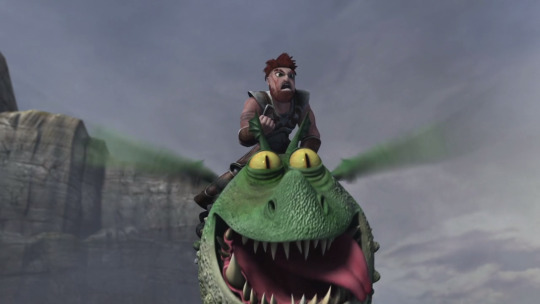
Fake deaths are a common narrative device in fiction used to build tension and create audience surprise. When done correctly, it can evoke shock, excitement, or a host of other suddenly-jarred emotions. Correctly done faked deaths can really get the audiences excited. When done incorrectly, though, it can feel like a very worn-out plot device… especially since it is a common trope.
It’s to note that repeating tropes within a single story - especially tropes with these sorts of high-drama elements - tend to wear out and annoy audiences. It’s not a good plot element to recycle and keep redoing; if ever done, it should be done once for optimal effect. Otherwise, you cheapen both the first faked death and the second, make the plot of the story predictable and repetitive, and rely too heavily on tropish plot devices to carry the narrative “forward.”
RTTE writers have already implemented the back-from-the-dead trope once. It’s what happened with Dagur in S3 to S4. We never saw Dagur’s body at the end of his “death scene” in S3′s Family on the Edge, and indeed, he comes back in the fourth season alive and well. Now, if Viggo came back from the dead, not only would we recycle the same overdramatic plot device… but we’d be pulling the same stunt with two characters in back-to-back seasons. At this point, it would feel much like a worn-out, recycled plot device… rather than giving us some new, more novel twists and turns.
I would MUCH more prefer that Viggo - and Ryker - stay dead for that narrative reason alone.
2. Viggo might have a disproportionate number of screen time otherwise.
I’ve always found it interesting how long a character stays an antagonist in the DreamWorks Dragons shows. The writers tend to have a set time frame in which the villain interacts with Hiccup before we move onto some new enemy. To recapitulate how long villains stayed in conflict with Hiccup:
Mildew: 1 season (ROB; 2 seasons, counting brief appearances in DOB)
Alvin: 2 seasons (ROB and DOB)
Dagur: 3 seasons (DOB, RTTE S1, RTTE S2).
Ryker: 3 seasons (RTTE S2-S4)
Viggo: 3 seasons (RTTE S2-S4)
Now, it is to note that RTTE seasons are half the length of ROB and DOB seasons, and that he only appears visually on screen at the end of RTTE S2… but we still get about the same amount of screen time per villain. At the moment, we have a pretty decent pattern in which the villains come, wreak havoc, but end their plot arcs before their presence gets worn out. We don’t drag out the villain plot arcs in the DreamWorks Dragons franchise.
Now, if we have Viggo return in Seasons 5 and 6, then he would disproportionately dominate much of the narrative throughout the HTTYD franchise. It might feel a little odd that this villain, whose presence has been keenly felt since RTTE S2, would be so prevalent, while the other antagonists would have a disproportionately lesser time being the bad guy.
So purely from a sake of balance, it’d be better for Viggo to be dead, too.
3. Still being alive would be unrealistic.
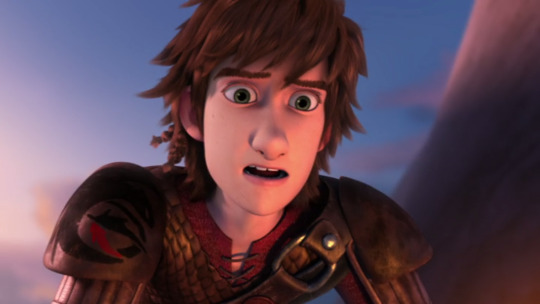
Race to the Edge is hardly accurate in how it portrays volcanoes. Oh goodness, it is very inaccurate in how it portrays volcanoes. That said, having a character seem to fall down into a volcano still seems like a sure way to perish. We could suggest Viggo grabs onto the side of the cliff or something like that, but regardless, chances of survival are extraordinarily, extraordinarily slim for him. It’s extremely likely he dies here.
Now, people could point out, “We don’t SEE him dead.” Yes, that is true. Nevertheless, would this show actually show a dead character on screen? Would they actually show the character getting impaled or hitting the lava or something else horrendous and graphic like that? Probably not. They’re going to show a character falling down into what should be a sure death without showing their actual death. Sort of like what just happened with Viggo.
Especially given as we see Hiccup watch Viggo fall, and Hiccup’s right there with his eyes glued on the volcano… it makes it a little hard to say that Viggo made it out alive. Look at Hiccup’s horrified expression. It seems he witnessed something directly.
Of course, this doesn’t have to mean that Viggo is dead, but the most they will ever show on screen I believe - for a children’s show like this - is an implied death with the camera focused on the individual (Hiccup) watching it.
4. Viggo’s ending is fitting to his flaws.
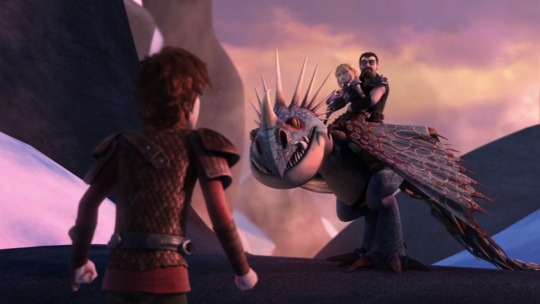
One of the things I have always been curious about was how Hiccup and Viggo’s intelligence match would progress. I suspected that, over time, Hiccup would learn how to outmanipulate the manipulator and beat Viggo at his own game - though in a way that demonstrated kindness and mercy rather than a drive for one’s own profit. I suspected that Hiccup would grow from being extremely frustrated about Viggo, feeling as though there’s no way he can beat the villain, to the person making Viggo unsettled and worried. There would be a turn of tides, with Hiccup eventually gaining the upper hand. That was my prediction.
Nevertheless, the fact that this is not what occurred still doesn’t mean it wasn’t an interesting and fitting way to end Viggo’s role as a villain. In fact, Viggo’s ending is fitting to his flaws in multiple respects - both in terms of Hiccup’s interactions, and in terms of Viggo’s character itself.
First, the fact that Viggo never becomes overwhelmingly bested by Hiccup means that Viggo will forever remain as the character who could outsmart Hiccup. Viggo retains his legacy forever, this way, which is actually sort of fitting. We don’t have an all-powerful protagonist who can magically outdo people at their own strengths. We have a villain who still gets defeated, but retains his legacy of his strengths. Viggo’s identity never unravels.
Hiccup still manages to outdo Viggo by throwing away the Dragon Eye, but it’s not an “outhinking”, so much. It shows Hiccup doesn’t have to become Viggo to best Viggo. Furthermore, it shows Hiccup’s growth from being obsessed about the Dragon Eye to the point he endangers his friends (Dragon Eye of the Beholder Part 2)… to being willing to sacrifice it because of the people he cares about - it’s not Hiccup becoming better than Viggo, but Hiccup becoming better at being Hiccup. Then, this event could help Hiccup grow into who he is by HTTYD 2, someone who doesn’t believe he can do everything (since he never got to outdo Viggo at his own game, in full).
Last, what happens is that Viggo’s core identity - that of a manipulator - is what leads to his own downfall. Viggo leads to Viggo’s own fall. It’s Shakespearian. It’s nice. It’s fitting to have him end in the way where his own strengths becomes his undermining weaknesses.
Viggo’s greatest strengths are his control over the dragon hunters, his manipulative abilities, and his desires for profits (which in turn fuels him to hunt dragons, seek the Dragon Eye, and thus clash with Hiccup so adamantly). These are what make him a villain to be contended with against Hiccup. All these things lead to his downfall in RTTE S4.
Viggo’s gripping control is what makes him a leader. But Viggo’s gripping control is what sours his relationship with his brother and turns Ryker against him (debatably - we’ll never know how much of that incident was staged trickery and how much was genuine rebellion). But more obviously, Viggo’s desire for profit and ability to manipulate is what led to his direct end. Viggo tried to manipulate Hiccup with Astrid. That backfired. It led to a situation where Hiccup had to throw away the Dragon Eye. Viggo wanted to get hold of the Dragon Eye - it was his pursuit from start to end of his role as villain - it’s how he could extend his profits as a dragon hunter. But his own drive for the Dragon Eye, the very reason that he was such a contender and dangerous enemy for Hiccup… is what led to him trying to grab the Dragon Eye… and thus falling to his death.
Had Viggo not wanted the Dragon Eye, he wouldn’t have been an enemy to contend with. But had Viggo not wanted the Dragon Eye, then he wouldn’t have fallen as he did.
So Viggo’s ending is superbly fitting to his character. The reasons why he butted heads with villain and became a dangerous villain are what became his downfall. Viggo brought about Viggo’s own end there at the end of S4. And that’s very fitting.
Now, it’s true that it might have felt anticlimactic in its execution, and I agree, but the concept is really something I can get behind. REALLY something I can get behind.
5. RTTE S4 wraps up basically everything with the Viggo plot arc.
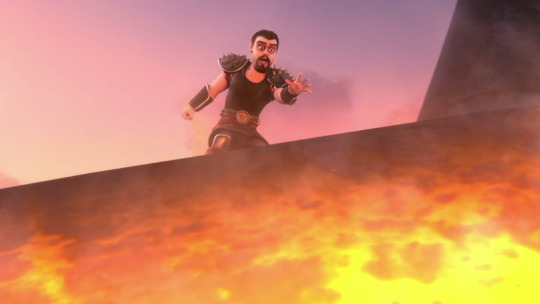
Viggo’s antagonist story doesn’t need to be continued. It is, in many ways, self-contained between seasons two through four. The main plot of Viggo bothering the youths through the dragon hunters and battling over the Dragon Eye is now done. The Dragon Eye is gone, after all. And even the problem of Hiccup needing to best Viggo to save the dragons is finished. Assuming Viggo and Ryker never come back, the dragon hunters won’t harm the dragons any more. The dragon riders have victory in all the areas that they need for the plot arc. They’re not going to be bothered by those dragon hunters again. Story closed.
So there’s no need to extend the plot arc with Viggo. We’ve gotten a full narrative arc with an ending that concludes just about everything that needs to be concluded.
Rather, I would prefer if we spent the next two seasons exploring the new plot device they’ve opened up with Krogan. If he becomes the main antagonist in the next two seasons, then that would make a lot of sense, have room for development, and make for a good lead-in to HTTYD 2 by the end of S6.
Now, the last thing I want to say is that, just because *I* think that it is better plot-wise on many fronts for Viggo to be dead… doesn’t mean he has to be dead. It doesn’t mean that this is the route the writers will take. My comments are not predictive, they’re just what I think would be best for the story were I writing it myself. It’s totally possible for Viggo to make a reappearance. I wouldn’t be all that astonished if it happened. But for me, personally, I want this to be the wraps on the Viggo story arc, for the reasons I outlined above! XD
#wickedwinterwillow#long post#pixie-dustss#rtte#Race to the Edge#DreamWorks Dragons#Viggo#Viggo Grimborn#my analysis#analysis#ask#ask me
62 notes
·
View notes
Text
Final Fantasy XV (First Impressions) Review
You know, I got Final Fantasy XV on the assumption that it’ll help me back on the PS4. I was practically devoting my time to the juggernaut of a gaming PC I built, that the poor black box on my shelf wasn’t getting enough of the attention I gave it back when I played Phantom Pain on it during my college days not too long ago. I wasn’t sure why else I bought it: I was never able to beat any Final Fantasy game before this one, so there was a possibility that it would tank from my gaming queue. Sure as hell didn’t turn out that way, judging by the hours atop hours I’ve played per day. Hell, I even beat the game not too longer after I bought it. But I’m not about to parade the rooftops and sing this games praises just yet. It’s probably not even my most favorite game, although it’s sort of up there, I admit. It’s a complicated relationship.
The story starts off stronger than most recent FFXV games, in that it doesn’t dump a whole bunch of stringy narrative threads all over the place. You play as Noctis, princely heir to the throne of the nation of Lucis, who must traverse the land and build up his royal magic with his three comrades, Ignis, Prompto, and Gladiolus, reunite with his fiancée Luna, and take the fight back to the Niflheim empire that had conquered his homeland. Like I said, that is as complicated as the story gets in XV, and I think that has something to do with the fact that Final Fantasy XIII, the previous single player game in the franchise, was critically not a very good game and was also mired in a confusing narrative, and Square Enix wanted to distance themselves from that for marketing reasons. I mean, the opening sequence starts the game proper with, and I’m not kidding here, a cover of Ben E. King’s “Stand By Me” as the title logo fades in. Right away, it tells you straight up that this isn’t your mom and dad’s Final Fantasy.
And it it’s as different as it gets, when compared to previous games in the series. Rather than having a hybrid action RPG style of gameplay, XV uses something called the Active Cross Battle system, which simply boils everything down an action game with RPG elements. I personally think makes the combat so much better than more of the alter games in the series. For one thing, commands are mapped directly on the controller for attacking, defending, and dodging, and Noctis has a whole suite of commands and abilities that are useful, but never feel too complicated to use in battle, like having his friends utilize their own special attacks or warp to a vantage point out of harm’s way to get a better look at the battle below. The battle system is solid, but not without a few nagging issues. For one, certain areas don’t really serve the battle system well, like cramped spaces and corridors or areas with a lot of obstructive, like trees and large rocks. Sometimes it’s hard to tell when to attack or when to block, especially when you can’t really see if an enemy is winding up an attack right behind you. Another thing is that there are special spells called summons, which call upon certain deities to aid you in battle. Provided they even decide to show up, because there doesn’t seem to be a way to tell when you can be able to summon them, or how long the cool down to summon another god is, and since they only show up when you’re really in deep trouble, you could probably get through the whole game without having to summon a deity, if you’re good enough.
The game is also, separating itself from Final Fantasy XIII, the game is mostly open world, with plenty of ways to get around and plenty of side quests and monster hunts to partake in. You can get around in the Regalia, your stylish car, or you can rent some of the classic Chocobo mounts, or you can rough it on foot to hunt for materials, bulk up your hunter rank by going on hunt mission for cash, search for hidden dungeons and go out fishing, and you can crash at the local motel and count up your XP and Ability points, that you can use to increase your stats, unlock new abilities, and make you and your crew much more formidable. The adventuring around the open world and the quirky interactions with the main four are what I think really kept me playing to the end. There’s a lot of streamline, yet rewarding tasks to uptake, and the multitude of traveling options, including the classic fast traveling, make things snappy and straightforward enough to keep your interest.
And that’s not even considering the cast of Noctis and his pals. The palaver that they share make them feel a lot more human than Final Fantasy XIII’s cast, at least. One event really helps this point, where Prompto makes a comment about a seaside restaurant being romantic, and the other three, including the usually professional Ignis, tease Prompto about how he’s in such a romantic place with his three manly friends. They’re penchant for showing concern and ripping on each other makes the traveling, the fighting, and even the down moments of the guys camping in the woods much more enjoyable. Noctis is a lot more capable and human than most people give him credit for. He can get stoic, and he gets bratty every now and then, but it’s not like that’s just the way he is, and it’s not like he doesn’t have an actual personality. He has the weight of the world on his shoulders, the responsibility to his kingdom, and his lineage, to fight against the evil that’s plaguing the world. he regularly jokes with his friends out in the wild, and had come to tears on more than one occasion because of the situation he’s in, which is a lot more than I can say for most protagonists in many video games nowadays. One scene way at the end of the credits, really shows how much he cares about his world and his friends. They aren’t the most complex of characters, and the story isn’t that deep to help them out with that, but the four boys in this party really show that they had a lot of care in their creation.
Although going back to the story, it starts to fold in on itself way later, especially when the story reaches Chapter 13. I won’t spoil anything, but I will say that the story takes a massive halt, but also takes three steps ahead of us, and I was personally left wondering why the game hadn’t properly explained anything going on in this chapter, especially considering that a lot of important events in the plot apparently took place off screen. I personally didn’t mind that this chapter started to get linear later, but the fact that so many things happened off the story’s watch is just unjustified. It didn’t help that the game also takes your weapons and party members away for this portion of the story as well. Now that I think about it, too much story wasn’t good for the previous games, but not enough story, or having players piece together what should have been explained outright, is in some ways worse. As of writing, Square Enix has addressed the problem, and are even going as far as to create all new scenes and record all new dialogue to make the chapter more palatable, so it shows that SE is dedicated to their product, but only time will tell if these new scenes will but the kick back in the story’s step.
Along with the news of added content and support for the game, like the recently announced Episode Gladiolus and Episode Prompto DLC, the design skins for the Regalia, the Chocobo races, the fantastic-looking food that boosts your stats, and all the other little feature and gameplay elements that are just quick but impactful enough to keep you in the experience, there’s just something about this game that just drew me in. The story is fine, although a bit dry at times, and the combat is just fluid enough to work with, even though it can fall flat at times. But the groundwork that all that is built upon is solid, and the overall experience is done well enough that I really would consider it one of my favorite games of all time. It’s hard to pin down what exactly got me hooked on the game, and I admit that it’s not a game for everyone, but I personally had a great time with the game, and as it continues to be reworked and built upon with upcoming DLC, you know I’m gonna dive back into the main story when everything is said and done.
2 notes
·
View notes
Text
Dragon Age 4: everything we know so far about the open secret of a sequel
New Post has been published on https://www.etechwire.com/dragon-age-4-everything-we-know-so-far-about-the-open-secret-of-a-sequel/
Dragon Age 4: everything we know so far about the open secret of a sequel
It’s now been more than three years since the release of Dragon Age: Inquisition and although we’re still squeezing fun out of the game, we think it’s pretty understandable that fans are getting somewhat inquisitive (sorry) with regards to when we’ll hear about the next game in the franchise.
Even though we all knew, on some level, that there would definitely be another Dragon Age game, it was nice to have a confirmation from executive producer Mark Darrah. Whether it will actually be called Dragon Age 4 is up for debate –historical naming patterns in the series meaning it could really go either way – but we can still get excited.
Named or not, now that we know Dragon Age 4 is in the works we think it’s time to start keeping an eye on the latest news, and start building a picture of what the game might eventually look like. So we’ve put together this hub of news and rumors to keep you up to date on the latest news from Thedas.
[Update: In a recent interview with Eurogamer, former Dragon Age boss Mike Laidlaw discussed the franchise and what he may have done differently with the last title: Dragon Age Inquisition. According to Laidlaw, when it was released, The Witcher 3 highlighted weaknesses in Inquisition and made him feel that his games was “a little hollow”. With the benefit of hindsight, Laidlaw has said that he’d “look closer to The Witcher 3” with relation to the game’s open world and story-heavy quests.
With Laidlaw having moved on we can’t be sure these feelings will be carried over to the development of Dragon Age 4. However, it seems likely that Dragon Age fans would appreciate more depth in the game world they love.]
Cut to the chase
What is it? The fourth installment in the popular RPG franchise, Dragon Age
What can I play it on? Not confirmed but it’s likely to be Xbox One, PS4 and PC
When can I play it? It’s likely to be a couple of years away
Release date
Despite the fact that the game’s development is currently a very open secret, Dragon Age 4 hasn’t actually been officially announced by BioWare. It’s hard, then, to say how far along the game’s development might be, and how close we might be to seeing it released.
Back in May 2017, writer Alexis Kennedy revealed that he was working on a part of the game’s story in an interview with Eurogamer. This part of the story, he revealed, is “well-segregated from other parts of the game”. At this point in time, the game was still clearly in the very early stages of development.
However, with a recent report from Kotaku suggesting that some of the Dragon Age development team has been pulled off the title to focus on creating Anthem, we think it’s likely to be a while before we hear anything concrete about Dragon Age 4’s release date.
News and rumors
Roundabout confirmations
Regardless of whether or not BioWare had confirmed it, Dragon Age fans were pretty certain that another game was going to be in the works. Partly because they had faith in the power of their sheer force of will and partly because over the last couple of years there have been hints from BioWare that something would indeed be happening. It’s the secret that was never really a secret.
The most recent non-official confirmation has come from executive producer Mark Darrah, who tweeted in January 2018 that he’s working on both Dragon Age as well as BioWare’s next big IP, Anthem.
Halfway through my trip to Barcelona!I’m here showing Anthem internally to EA. I am EP of BOTH DA and Anthem working with @Bio_Warner as Game DirectorAnthem’s up next but there are people hard at work on both franchises and I look forward to sharing more in the futureJanuary 24, 2018
Though he’s now left the company, BioWare veteran Mike Laidlaw was tweeting that there was still another couple of games in Dragon Age series yet back in mid-2017. Even before that, Alexis Kennedy became the writer that launched a thousand headlines after comments he made in an interview with Eurogamer were taken as a semi-official confirmation of the game’s existence and his place in it.
There is no planned ending for DA. There is an evolving plan that tends to look 2 games ahead or so. https://t.co/6Tp1lP6d5GAugust 8, 2017
In the interview Kennedy teased that he’s been “given considerable autonomy to work on a storyline bit of lore which is well-segregated from other parts of the game.“
”I don’t want to exaggerate the degree of the chunk [I’m writing],“ Kennedy he was at pains to add. ”It’s nothing that grandiose, but it is distinct. It’s a bit of lore which has not been addressed much to date in Dragon Age.“
Story and character
Every game in the Dragon Age franchise has had a heavy emphasis on story and character and fans will be glad to know that Dragon Age 4 isn’t likely to be any different.
After Mark Darrah tweeted that he was working on the game, BioWare general manager Casey Hudson chipped in with his own elaborative tweet. In this tweet he said it was “too early to talk details” but the game would be “story & character focused.”
Reading lots of feedback regarding Dragon Age, and I think you’ll be relieved to see what the team is working on. Story & character focused.Too early to talk details, but when we talk about “live” it just means designing a game for continued storytelling after the main story.January 25, 2018
It’s not clear whether this will be a brand new standalone game or whether it’ll continue on directly from Inquisition. Certainly, the end of Inquisition’s Trespasser DLC suggests there is a story thread to follow with Solas, which would see the Inquisitor chase the elf down to stop his plans.
We already know there are writers working on lore and side quests, following Alexis Kennedy’s interview with Eurogamer in 2017 in which he confirmed he was working on a part of the game that’s “well-segregated” from the rest and focuses on some lore that’s not been widely addressed.
Kennedy, who has worked on titles such as Sunless Sea and Fallen London, said the subject matter would not be surprising to those familiar with his work. To us this implies that his quest (or quests) will include thoughtful choices, themes of tragic love and desire and an underlying sense of unease.
New live elements
In the January 2018 Kotaku report on Anthem and Dragon Age, it was mentioned that sources had informed Kotaku that Dragon Age had been “rebooted” in order to implement more “live elements” into the game.
Naturally, there was some fan panic in response to this given EA’s increasing penchant for service-based games. Fans expressed concern that BioWare was going to take the Dragon Age series down a Destiny 2, always-online multiplayer route.
That doesn’t appear to be the case, however. In his tweet, Casey Hudson also stated that the “live” elements being considered are actually ways of continuing the game’s story after the main story has been completed. This is something we’ve already seen in games such as Assassin’s Creed Origins.
Things we’d like to see
A world like Dragon Age: Inquisition
We hope that the next Dragon Age game has a map similar to the one in Dragon Age: Inquisition, by which we mean we hope it’s big and open without being overwhelming. It was the perfect follow-up to the closed and repetitive maps of Dragon Age 2 and we’d like this approach to continue.
Explore more of Thedas
There’s one very notable part of Thedas that players have yet to be allowed to explore and that’s the Tevinter Imperium. Once the most powerful nation in Thedas, the Imperium is a shadow of its former self. Its history, stratified social structure and maintenance of a magocracy would make it an immensely interesting and different part of Thedas to allow players to explore, while allowing the franchise to continue to explore themes of social injustice, power and prejudice.
The fact that the area is references throughout other Dragon Age games is enough to make us think it’s a viable setting for Dragon Age 4. However, the ending of Dragon Age: Inquisition’s Trespasser DLC makes us think it even more likely, as it sees the Inquisitor stab a dagger into a map of the Imperium with a vow to track down Solas.
Solve that cliffhanger
Our previous point brings us to this one – we’d really like that Solas storyline to continue to be explored. He’s the perfect focus for the next game and the player’s approach to him is the perfect narrative crux.
0 notes
Text
Thanos Shrugged... or A No-Spoilers Review of Spoilers: the Motion Picture (a No Spoilers Avengers: Infinity War review)
So I’ve seen Infinity War twice now. That’s rare for me to do before I write a review. I saw it originally Thursday night and then again on Friday. I wanted to really think it through so I could find a way to review it without spoilers. I did write up a “call for comments” for my podcast blog (cheap plug, go subscribe to my podcast!!!) as our next episode is going to be about film franchises as a new media type, but I went out of my way there to address the movie as little as possible to avoid spoilers for people who haven’t seen the movie yet. And then I realized that the reason this is so hard is that this isn’t really a “movie” per se… not in the traditional sense. It’s not even just a Hollywood blockbuster… and it’s not just an entry in the MCU Franchise TV show that we only get to watch in movie theaters. This is may be the greatest ever entering in a different type of motion picture altogether. This is a spoilerogram!
Sometimes people complain about my star scoring on some movies. Especially the superhero or otherwise genre based blockbuster ones because I never put them that high. As I’ve explained before, I try to rate movies on the same scale just so that the rating have some sense of meaning, even though in reality I know it’s impossible to really compare say a Ladybird to a Logan. They’re different types of movies, trying to do different kinds of things. This also allows me to analytically take my personal enjoyment out of the review. My key example is always Suckerpunch. A movie that I personally LOVE!!! Even though I am completely aware that it isn’t very good.
When I do this I try to think of how the movie stands up to classic rules of cinematic story telling. How well does this tell a complete story with a beginning, middle and end? How well can a person who has no experience with this world become invested in it and enjoy it? Are the characters fully developed and realized and engaging? How does this piece of art stand as a complete and cohesive work in and of itself? And if I had to judge this movie on THOSE merits alone, it might very well get a zero. A one at best.
I’m not sure this is a movie.
It does not stand alone. Even more so that other films that are part of long running series. I don’t expect Lord of the Rings: The Two Towers to stand alone. It is a part of a greater narrative. Similarly, I especially don’t expect Harry Potter and the Deathly Hallows: Part 1 to stand on its own. In both of those cases we are looking at a film that is intended to be part of a much greater whole. And yet, there is enough there that they feel like complete movies. There is a beginning to the narrative. There are character introductions. There is a building action and a decisive end point that makes it feel like the end of one story and makes you excited for the next one. They are complete.
Infinity War is more like picking up a 24 chapter novel and skipping to chapter 19, reading it, and then setting it down.
It’s a good thing that those two chapters just happened to be really good. But they’re not a story.
At least not by themselves.
Crossovers have been a staple of super hero comic books for over seventy years. And the comic book mega-event crossover for over thirty. Up until this point, attempts to bring this to the movies have worked by movie rules. There can be related to other things but each one stands in and of itself. Essentially, both the first and second Avengers movies were Secret Wars. There was an assumption that the reader had some passing familiarity with the characters at least. There is an awareness that there are other movies in the franchises, and that the moviegoer is looking to see all of these characters in the same sandbox. But if you aren’t aware of what was happening in some of the individual franchises, it just didn’t matter. Thor even tells you this in the first film Avengers film. There’s a question as to why he is even there, since according to the continuity between his first and second film, he should have been trapped in Asgard. He basically says “magic, don’t worry about it” and the film moves on never thinking about it again. Because, despite it’s protagonist being one of the stars of the film, the concerns of the Thor franchise are outside of the scope of that film. This is similar to other blockbuster franchises. If I am a fan of Star Wars movies, I am able to watch the films and ignore all the side novels, comic books, cartoons and other supplemental media. Everything that is important to the main narrative, happens in the main films.
This one is different. This is more like a more modern comic book crossover event. The narrative is split over a billion separate parts in different series and the main series assumes you are following all of them. From the very first scene of Infinity War, it is readily apparent that the concerns of the Thor franchise are very much relevant to this film. As are the concerns of every other MCU franchise. But since this is chapter 19, of the novel, the film isn’t going to bother to recap chapters 1-18. They matter, and you should have read them asshole! It feels like that’s what this film is saying to you. So much so that the inconsistencies in the film with other chapters seem to REALLY STAND OUT from that very first scene (mostly due to the absence of certain characters, presumedly for budgetary reasons).
That’s not to say that this is bad. It has emotional stakes. It has pathos. The actors make you care about the events that happen to their characters. It’s just that the film relies on you being “all in” to the greater narrative that is the MCU. Whatever this is, it’s bad… it’s just not… a movie.
And that’s what makes its hard to talk about without spoiling anything. There’s no building action to this. It starts out in medias res and doesn’t let up. It’s hard to talk about any specifics of the film because it really is two and a half hours of continuous pertinent plot points. The film is nothing but spoilers.
What I an say is that it does pose interesting thematic questions. What has made the Marvel films so successful is that at heart they have attempted to be movies first and superhero movies second. A large part of this has been, rather than focusing on big beefy guys punching the shit out of each other, many of the previous films have been built around the same complex thematic questions that one would construct any other speculative fiction film around… and then having big beefy guys punching the shit out of each other. What I found most interesting about the film is that the narrative, such that it is, is built around a very fascinating moral question that places moral objectivism in conflict with relativism and asks you to consider, not only whether or not philosophical objectivism can even exist, but which side is even subscribing to it. If deconstructed to its bare bones, the central conflict amounts to a trolley problem… one where I’m not sure which side of the conflict is trying to throw the switch and which one is trying to hold it.
And that is fascinating… it is a question that I think in a different film, could be debated for hours, with no one ever coming to a conclusive decision. In this film, even though it is central to the narrative and a constant question throughout almost every scene, there is so much more going on with regards to the greater MCU narrative, the worry of who will live and who will die, the ramifications of those events, the incredible amount of pathos that Marvel has frankly completely earned through the previous films even if it doesn’t come from this one in specific and the constant visual spectacle from the very impressive beefy guys punching the shit out of each other, that the thematic philosophical question kind of seems to fade into the background.
And that’s a shame. But maybe that’s just what we do. After all, how many people really understand the deeper philosophical ramifications of Atlas Shrugged anyway… it’s easier to just say “oh, this means I can be selfish and lower taxes for the rich!” than it is to question which side of the ideology you are actually embodying. And Galt or Taggart had been a giant purple alien with a magical bejeweled oven mitt would it have made any difference? Wait, which one are we supposed to be be admiring anyway? *shrug*
((∞✊🔴💜🔵💚💛🔶)/√-1)☆☆☆☆(STACK OVERFLOW – RUNTIME ERROR out of 5 stars)
Related articles
Gwyneth Paltrow admitted she’d never seen an Avengers movie – even though she’s in 2 of them
Superhero Bits: ‘Infinity War’ Breaking Opening Day Records, ‘Venom’ Trailer Easter Eggs & More
Agents of SHIELD Referenced Infinity War – And It Was Laughable
‘Avengers: Infinity War’ is an overstuffed adventure with a terrific villain
Find Out Why Anthony Mackie Fears ‘Avengers: Infinity War’ Will Be ‘Awful’
‘Avengers: Infinity War’ review: Disarmingly audacious
Lee Sheng, Steve Shaffer, Nicole Aceto, Danny Anderson, Michael E. Higgins, Cheryl Platz, Karl Greenley, Andy Stowell liked this post
(function(d, s, id) { var js, fjs = d.getElementsByTagName(s)[0]; if (d.getElementById(id)) return; js = d.createElement(s); js.id = id; js.src = "//connect.facebook.net/en_US/all.js#xfbml=1&appId=1449198322001470"; fjs.parentNode.insertBefore(js, fjs); }(document, "script", "facebook-jssdk"));
Thanos Shrugged… or A No-Spoilers Review of Spoilers: the Motion Picture (a No Spoilers Avengers: Infinity War review) was originally published on ChrisMaverick dotcom
#Avengers (comics)#Infinity War#marvel cinematic universe#Marvel Studios#Production of Avengers: Infinity War and the untitled Avengers sequel#Star Wars
0 notes
Text
An incomplete list of Hollywood’s favorite excuses for whitewashing and why they’re nonsense
Scarlett Johansson in Ghost in the Shell
Image: paramount
Between Iron Fist, Ghost in the Shell and that first Death Note trailer, it’s been a banner month for racially insensitive casting.
But while the problem may be getting extra attention right now, it’s not new and it doesn’t seem to be going away anytime soon, either. In fact, with each passing controversy, the excuses have just started to sound more and more familiar.
SEE ALSO: Netflix’s ‘Death Note’ teaser trailer opens the book on horror and destruction
Hollywood’s racial bias comes in many forms. Sometimes it’s “whitewashing” casting a white actor to play a character who was originally conceived of as non-white, like the Major in Ghost in the Shell or Light in Death Note. (John Oliver has an excellent primer on the industry’s long history of whitewashing here.)
Other times, it might be favoring a white lead character in a narrative that borrows problematically from non-white cultures like positioning Iron Fist‘s Danny Rand and Doctor Strange‘s Stephen Strange as the ultimate practitioners of mystical martial arts that they learned in made-up Asian countries.
Perhaps most insidiously, it can also mean simply overlooking POC talent, and defaulting to white characters and white actors time and time again, even when there’s no narrative reason to do so. We adore Tim Burton and the Coens as much as the next person, for example, but it’s hard to deny that their films tend to be pretty homogenous.
(And we’re just talking about casting here, though the data shows that there’s racial inequality in basically all areas, at basically all levels of the industry. More on that here.)
Image: giphy
If there’s a bright side to these seemingly endless controversies, it’s that they’re making headlines moviegoers seem less and less willing to let this kind of prejudice slide. Even as journalists and audiences have become more critical, though, too many stars and filmmakers seem to be stuck pushing the same old defenses.
So in the interest of saving everyone some time, we’ve compiled some of Hollywood’s favorite excuses for favoring white people in casting and some thoughts on why each one falls apart.
Actually, this is a really diverse cast.
Eddie Redmayne and Katherine Waterston in Fantastic Beasts and Where to Find Them
Image: Warner Bros.
Recently used by: J.K. Rowling, who insisted, “Everyone in Fantastic Beasts is not white.”
Also used by: Steven Paul (Ghost in the Shell), Joe Wright (Pan), Ridley Scott (Exodus: Gods and Kings), Finn Jones (Iron Fist).
Why it’s nonsense: This excuse might hold up if it were actually true in any meaningful sense if, in fact, the real problem was that detractors were just woefully misinformed about the makeup of the cast and/or the significance of their roles.
But very often, the “diverse” cast members turn out to be supporting players or even extras, while white stars get the meaty leading roles. Yes, it’s nice that America’s wizarding community has a black female leader in Fantastic Beasts, or that Tiger Lily’s tribe is a racially diverse bunch in Pan. It’s just too bad they get fuck-all to do compared to the white leads.
Even in Iron Fist, which is a bit more evenhanded than some of these other examples, there’s no question of whose story gets top priority and it’s not Claire Temple’s or Colleen Wing’s.
This argument, then, turns out to be disingenuous. It makes no distinction between a high-profile hero and a half-baked love interest, a one-off guest star, or a non-speaking extra.
This is a universal story.
Russell Crowe in Noah
Image: paramount
Recently used by: Producer Ari Handel, explaining why Darren Aronofsky’s Noah was about a bunch of white people. “From the beginning, we were concerned about casting, the issue of race,” he stressed, before going ahead to put his foot in his mouth:
What we realized is that this story is functioning at the level of myth, and as a mythical story, the race of the individuals doesnt matter. Theyre supposed to be stand-ins for all people. Either you end up with a Bennetton ad or the crew of the Starship Enterprise. You either try to put everything in there, which just calls attention to it, or you just say, Lets make that not a factor, because were trying to deal with everyman.
Also used by: Lilly Wachowski (Cloud Atlas).
Why it’s nonsense: Leaving aside that it’d actually be really nice to see a cast diverse enough to make up a Benetton ad, why should “everyman” default to white? (We can’t know the ins and outs of casting for Noah, but Handel makes no indication that they ever seriously considered the possibility of, say, an all-Middle Eastern cast.) The assumption here seems to be that only people of color have race, while white serves as a totally neutral default.
Cloud Atlas and Noah might think they’re beyond race somehow, because they’re concerned with lofty ideas but they’re still movies made by and for people who live in this world, with all of our weird racial hangups and troubling cultural contexts.
We wanted to avoid stereotypes.
Tilda Swinton in Doctor Strange.
Image: marvel/disney
Recently used by: Doctor Strange director Scott Derrickson, who in trying to avoid one controversy face-planted straight into another. It was a challenge from the beginning that I knew I was facing with both Wong and the Ancient One being pretty bad racial stereotypes1960s versions of what Western white people thought Asians were like,” he said. “We werent going to have the Ancient One as the Fu Manchu magical Asian on the hill being the mentor to the white hero. I knew that we had a long way to go to get away from that stereotype and clich.
Also used by: Johnny Depp (The Lone Ranger).
Why it’s nonsense: Avoiding stereotypes is a good goal to start with, but casting a white person to play the part of a person of color doesn’t fix that problem. It just creates a different one. The better approach in scenarios like these would be to subvert the stereotype, maybe by using the character to comment on it or simply by fleshing them out so much that they’re not a flat, two-dimensional archetype any more. Or, better yet, start by asking yourself it’s even worth resurrecting such an outdated and possibly racist property in the first place.
But we hired a woman.
Scarlett Johansson in Ghost in the Shell
Image: paramount
Recently used by: Ghost in the Shell star Scarlett Johansson, who used Hollywood’s woman problem to deflect a question about Hollywood’s race problem. “I certainly would never presume to play another race of a person. Diversity is important in Hollywood, and I would never want to feel like I was playing a character that was offensive.”
However, she continued, “having a franchise with a female protagonist driving it is such a rare opportunity. Certainly, I feel the enormous pressure of that the weight of such a big property on my shoulders.”
Also used by: Tilda Swinton and Kevin Feige (Doctor Strange).
Why it’s nonsense: We’re all for seeing more and better female roles, but gender and race aren’t somehow equivalent or interchangeable. Bringing in a white lady doesn’t magically make up for erasing a person of color. Plus, this line of argument conveniently forgets that women of color exist. Ghost in the Shell wouldn’t have been any less female-led if its star had been an Asian or Asian-American woman.
We hired the best person for the job.
Characters voiced by Charlize Theron, Art Parkinson and Matthew McConaughey in Kubo and the Two Strings
Image: Moviestore/REX/Shutterstock
Recently used by: Director Travis Knight, addressing why his Japan-set fantasy Kubo and the Two Strings has a mostly-white voice cast. Ultimately, what matters most for us is the ability for an actor to convey the nuance and the emotional truth of the role using the only tool that they have at their disposal, which is their voice, he said. “There are very few actors in the world that can do that. There are a lot of great actors that cant do that.
Also used by: Tina Fey (Whiskey Tango Foxtrot), Scott Buck (Iron Fist), Rupert Sanders (Ghost in the Shell).
Why it’s nonsense: “Hiring the best person for the job” sounds all good and fair in theory. But “best” is a subjective measure, and the specific criteria are set by the filmmakers. If they believe the “best” person for a non-white role is a white person, it means the filmmakers decided that racially sensitive casting wasn’t something they felt they needed to address.
(Keep in mind, too, that “best” can encompass all sorts of qualities that have little to do with the actual quality of an actor’s work, like how famous they are or what their public image is. It’s not as if the casting process exists in some artistically pure plane before race is factored in.)
Furthermore, there are plenty of films that seem to fare just fine with racially appropriate casts. Kubo itself was shown up a few weeks later by Moana, which went out of its way to find stars of Polynesian descent and was rewarded with praise in addition to all its of excellent reviews and truckloads of money.
Non-white stars arent bankable.
Joel Edgerton, Sigourney Weaver, John Turturro and Christian Bale in Exodus: Gods and Kings
Image: Fox/Scott Free
Recently used by: Ridley Scott, who blamed the business for making his Egypt look so white in Exodus: Gods and Kings. “I cant mount a film of this budget, where I have to rely on tax rebates in Spain, and say that my lead actor is Mohammad so-and-so from such-and-such,” he said. “Im just not going to get it financed. So the question doesnt even come up.”
Also used by: Dana Brunetti (21).
Why it’s nonsense: This argument sounds kiiinda pragmatic until you start to break it down. Sure, Exodus star Christian Bale is world famous. But is Joel Edgerton’s international fanbase really that big? Is 21 star Jim Sturgess’? And why are the options here “white A-lister” or “nameless nobody”? Non-white stars exist some of them even starred in Scott’s next movie, The Martian.
This rationale also conveniently forgets that Hollywood doesn’t just employ stars it creates them. Indeed, Sturgess himself was just a scrappy up-and-comer when he landed 21, which would turn out to be one of his first big breakthroughs. Brunetti could’ve used this opportunity to boost an Asian-American actor; he just chose not to.
And yes, while conventional wisdom might state that only white-led movies do well overseas, the conventional wisdom in this case is wrong.
Why would we need non-white people in this?
Ella Purnell, Asa Butterfield, Eva Green and more in Miss Peregrine’s Home for Peculiar Children
Image: fox
Recently used by: Tim Burton, justifying the lily-whiteness of Miss Peregrines Home for Peculiar Children. “[T]hings either call for things, or they dont. I remember back when I was a child watching The Brady Bunch and they started to get all politically correct. Like, OK, lets have an Asian child and a black,” he said.
“I used to get more offended by that than just … I grew up watching blaxploitation movies, right? And I said, thats great. I didnt go like, O.K., there should be more white people in these movies.”
Also used by: Joel and Ethan Coen (Hail, Caesar!).
Why it’s nonsense: Once again, this argument only makes sense if you assume that white stories and white characters are the default, whereas non-white stories and non-white characters have to be specifically “called for.”
This, by the way, is how you end up with stereotypes: by presuming that, say, a Latino character should only exist if there’s something “Latino” about the story.
And never mind that the blaxploitation genre, which Burton cites in his own defense, was created specifically because black people weren’t being represented in “mainstream” (i.e., white) movies.
This character is supposed to be (or look) white.
Matt Damon in The Great Wall
Image: Universal
Recently used by: Matt Damon (The Great Wall). I didn’t take a role away from a Chinese actor … it wasn’t altered because of me in any way,” Damon said, adding that he hopes criticism of the film will die down once people see that its a monster movie and its a historical fantasy.
Also used by: Cameron Crowe (Aloha), Ben Palmer (Urban Myths)
Why it’s nonsense: Of course you can have white characters in a story full of non-white people. Of course some non-white people can pass for white. But that doesn’t mean it makes sense to cast a white person as the star of a story about a person or a culture of a different background.
The reason it’s frustrating to see Damon in The Great Wall or Emma Stone in Aloha or Joseph Fiennes in Urban Myths is that it’s hard enough for an actor of color to snag a meaty role without getting shut out of stories that borrow from their culture or revolve around people of their heritage.
In short, as Hollywood continues to drag its feet on casting actors of color, their arguments are only wearing thinner. The only real fix is for this industry to become more inclusive.
That might mean reinventing an old property by bringing in a Native-American lead. Or launching the next big movie star from the pool of overlooked Latino actors. It might even mean gasp! hiring an actual Asian person to play an Asian person.
What it definitely doesn’t mean is returning to the same old excuses for keeping out people of color. We’ve heard it all already, Hollywood. It’s time to write a new story.
WATCH: Viola Davis is the first black woman to win an Emmy, Tony, and now, an Oscar for acting
Read more: http://ift.tt/2oeEzje
from An incomplete list of Hollywood’s favorite excuses for whitewashing and why they’re nonsense
1 note
·
View note